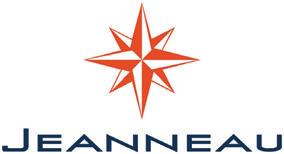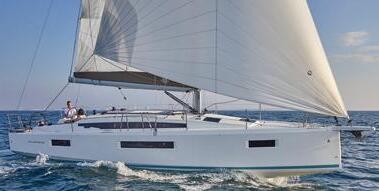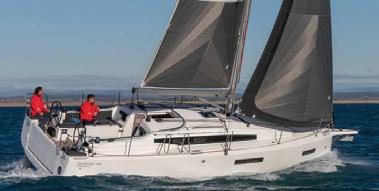








































MKIV Furlers are one of the most popular products in the Harken product line for racing. Harken now offers MKIV OCEAN built with MKIV quality but configured for the cruising sailor. For the occasional racer, the MKIV line is engineered with ease, durability, and winning in mind.


# Multiple rows of Torlon® ball bearings in high-load areas minimize friction.
# Stacked bearing races evenly distribute radial and thrust loads; drum and halyard swivel turn freely under load.
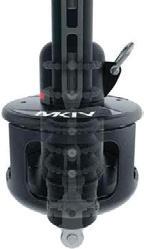
# Foils rotate around headstay so headstay load is isolated from the furling unit for easy furling.
# Large inner spool diameter increases mechanical advantage for powerful reefing and furling.
# Aluminum line guard, torque tube, and swivels deep saturation hardcoat anodized, UV-stabilized for durability.
# Line guard polyurethane coated for wear protection.
# Specially formulated low stretch black line is abrasion and UV resistant; standard on units 0, 1, 2.
# Aerodynamic (MKIV) and round (MKIV Ocean), clearanodized aluminum foils handle extreme reefing loads.
# Triple interlock foil joints withstand years of torque loading: foil connectors geometric shape interlocks with foil; secures with syringe injected adhesive; screws provide final lock.
To view our complete Harken offering visit fisheriessupply.com/harken

FEATURES
28 A Boat, a Baby, and Bears!
A family cruise around Cape Caution and Eucott Bay.
 By Lauren Upham
By Lauren Upham
32 Our Own Way
The classic wooden tugboat, Teal, has a near miss in Pole Pass. By Lisa
Nickel36 Is This For Real?! 48° North Cruising Rally 2023
A terrific group of cruisiers have a fabulous time in the islands. By Joe
ClineCOLUMNS
20 Three Sheets NW: Princess Louisa Inlet
A long-anticipated visit to this hallowed cruising destination.
By Deborah Bach22 Casting Off: The Cut of Our Jib
Helpful lessons on headsail trimming for novice sailors.
By David Casey24 A Northwest Sailor Navigates the Past
Cruising British Columbia with classic books and stories.
By Lisa MighettoRACING
40 STYC’s Women at the Helm 1
Good times, great sailors, and champagne sailing.
41 Whidbey Summer Classic
Lovely Penn Cove conditions and OHYC hospitality.
42 Red Ruby Report: France to England and Back
A PNW pair sail the IRC Doublehanded European Championship.
45 Shaw Island Classic
Counterclockwise pays off during the 53rd annual edition.
46 A Light Air Double Damned
Unusual breeze for the Gorge’s downwind distance race.
Spoiler alert for the 48° North Cruising Rally feature article in this issue (page 36) — it was amazing! One element of this rally’s awesomeness was how unseasonably quiet the islands felt. The anchorages of the San Juan and Canadian Gulf islands were less-populated during the last week of July 2023 than I’ve seen them in the six years we’ve been running our cruising rally, or any of my other summer cruises in the last decade. While I’d wager that few folks are more enthusiastic about increasing sailing and cruising participation than I am, I admit it was awfully nice to experience a few places as less crowded than “normal.”
In past years, we have taken one look at Garrison Bay near English Camp on San Juan Island, and promptly kept on moving because it was so busy. This year, it couldn’t have been more different. We got a beautiful spot at the shallow head of the bay near Guss Island and had no problem finding swing room for all nine of our rally boats nearby. It’s a big bay, and nearly all anchorable, but it was pretty remarkable to get such prime spots with ease.
We had an even more deserted experience at another bay that can accommodate large numbers of boats — Winter Cove on the north end of British Columbia’s Saturna Island. When I’ve stayed there previously, I’d estimate we shared the bay with at least 40 other boats and still had a lovely time. In 2023, we rolled in to find four (four!) other boats anchored. Only one or two others joined by the end of the evening, so it really felt like we had the place to ourselves. And with its shores being mostly BC Marine Park, it truly felt more remote and pristine than before.
Our other rally anchorages followed suit. So, why are the islands so sparsely populated this year? We’d welcome your feedback if you’ve noticed similarly quiet bays (or not), or have theories about what’s behind this trend. It would be nice to have exhaustive scientific data about this but, in lieu of that, here are my unverified ideas.
My central thought is that many, many folks who enjoyed boat-based staycations during the past three years finally felt good about planning bigger, more distant summer vacations in 2023. Certainly, the San Juans have never teemed more than in the past couple of years when most or all American cruisers were not sailing to the Canadian cruising grounds (either due to border closures or the compliance challenges that followed). So, now that clearing into Canada is again a very simple process, it is possible that’s where all the boaters are.
Still, the emptiness of Winter Cove calls that into question. So, perhaps the cruising paradise even farther north is busier. Desolation Sound, the Broughton Archipelago, even Alaska… maybe they were jam-packed this summer, but we haven’t heard as much. I think it’s more likely that folks who vacationed afloat in local waters recently have elected for travel utilizing air foils that lift vertically, instead of horizontally; or traded diesel for jet fuel.
Whatever the cause, the islands cast their spell more strongly than ever with smaller crowds and the choicest anchoring locations. I hope your summer cruises in these extraordinary waters have been similarly wonderful.
And if, by chance, you’ve got some fall cruising planned, I expect you’ll find our water wilderness every bit as beautiful, enticing, and quiet as it is in your daydreams.
I’ll see you on the water,
Joe Cline Managing Editor, 48° North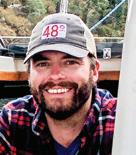
Volume XLIII, Number 2, September 2023 (206) 789-7350
info@48north.com | www.48north.com
Publisher Northwest Maritime Center
Managing Editor Joe Cline joe@48north.com
Editor Andy Cross andy@48north.com
Designer Rainier Powers rainier@48north.com
Advertising Sales Kachele Yelaca kachele@48north.com
Classifieds classads48@48north.com
Photographer Jan Anderson
48° North is published as a project of the Northwest Maritime Center in Port Townsend, WA – a 501(c)3 non-profit organization whose mission is to engage and educate people of all generations in traditional and contemporary maritime life, in a spirit of adventure and discovery.
Northwest Maritime Center: 431 Water St, Port Townsend, WA 98368 (360) 385-3628
48° North encourages letters, photographs, manuscripts, burgees, and bribes. Emailed manuscripts and high quality digital images are best!
We are not responsible for unsolicited materials. Articles express the author’s thoughts and may not reflect the opinions of the magazine. Reprinting in whole or part is expressly forbidden except by permission from the editor.
SUBSCRIPTION OPTIONS FOR 2023! $39/Year For The Magazine
$75/Year For Premium (perks!) www.48north.com/subscribe for details.
Prices vary for international or first class.
Proud members:
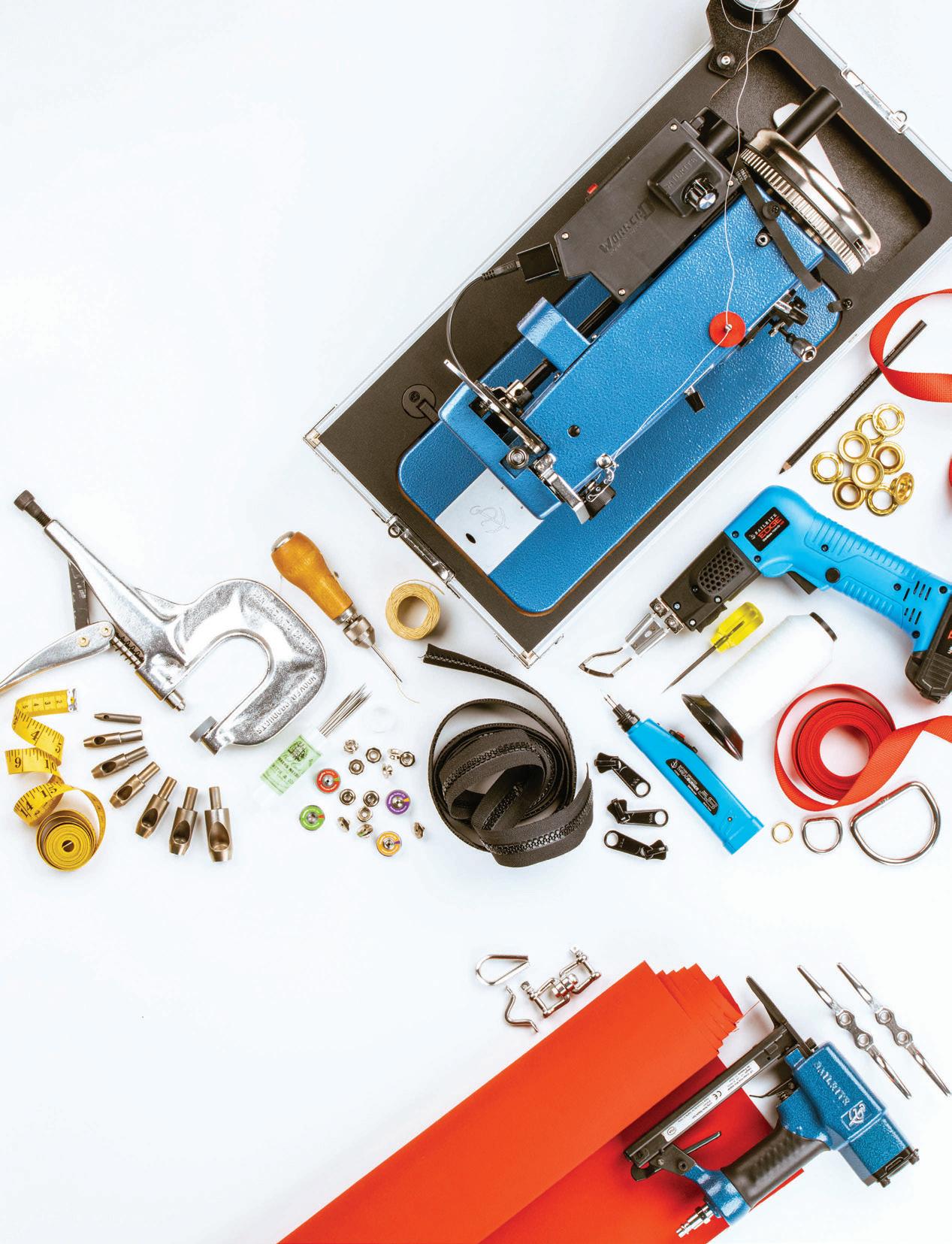


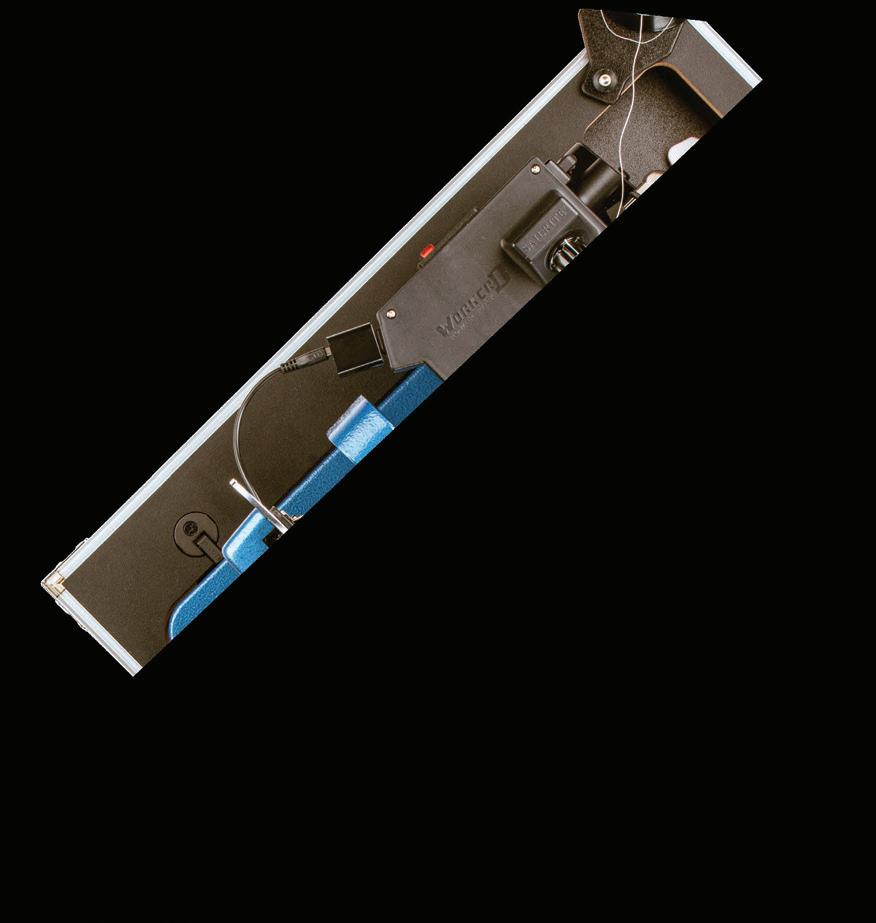
48° North has been published by the Northwest Maritime Center (NWMC) since 2018. We are continually amazed and inspired by the important work of our colleagues and organization, and dedicate this page to sharing more about these activities with you.
48° North is part of something bigger, and we believe the mission-minded efforts of our organization matter to our readers.
A groundbreaking and innovative partnership between Highline Public Schools, Northwest Maritime Center, and Seattle Maritime Academy has recently been established to help address the increasing need for maritime employees in the Pacific Northwest.
Beginning in the 2023-24 school year, Maritime High School students entering grade 11 can select to participate in a twoyear Vessel Operations, Design, and Maintenance pathway at Seattle Maritime Academy. The partnership agreement will enable students to graduate high school with both a high school diploma and essential maritime credentials, such as the Qualified Member of the Engineering Department (QMED), a highly sought-after industry qualification. All costs associated with attending Seattle Maritime Academy and earning maritime certifications and screenings will be covered in full for participating Maritime High School students.
“We are excited for our students as they embark on these pathways and are grateful for the partnership with Seattle Maritime Academy,” says Highline Public Schools Superintendent Ivan Duran. “This partnership underscores our commitment to preparing students for the future they choose. Working together with our partners, we equip students with what they need to chart their course in the maritime industry and beyond.”
Since opening in 2021, it has been the mission of Maritime High School to prepare its graduates for maritime careers or post-secondary education to continue marine-related studies.
EVENTS CALENDAR » www.nwmaritime.org/events
September 16-17
Port Townsend, WA
September 18 - 24
Port Townsend, WA
“There are incredible opportunities in maritime careers. We need more collaborations like this if we’re going to connect the incredible opportunities with young people. Bridging the gap between high school, college, and careers is critical,” said Jake Beattie, Chief Executive Officer of the Northwest Maritime Center.

Maritime High School is currently accepting students entering grades 9-11. The school is open to any student who is interested in maritime studies, whether they live within Highline Public Schools boundaries or not. To learn more or apply to attend Maritime High School for the 2023-24 school year, visit: » www.maritime.highlineschools.org/
PADDLES, OARS, SPARS, AND MORE
September 28 - October 1
Port Townsend, WA
RULES OF THE ROAD AND AIDS TO NAVIGATION
October 24-25
Virtual Class
It’s a soirée, a moist-eyed look back at R2AKs past, a glance ahead at the dumb ideas to come, and everyone is welcome. The annual Blazer Party — September 8 at 6 p.m. during the Wooden Boat Festival — brings together racers and those afflicted with whatever disease causes them to call themselves race fans. It's a chance to share the stories, embellishments, and outright lies of this year’s race; and be the very first to hear the news about R2AK 2024. Tickets: » events.humanitix.com/r2akblazerparty2023
Hosted at The Golf Club at Newcastle on September 15, this annual maritime networking and fundraising event now benefits Maritime High School. Foursomes and sponsorships are filling quickly. Reserve your spot to raise money to help create the pipeline for our future maritime workforce.
» www.nwmaritime.org/events/towboat-golf-classic-2023






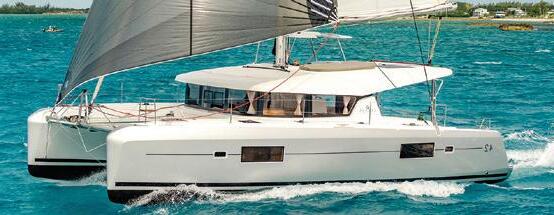


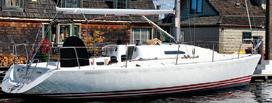






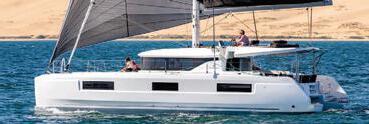








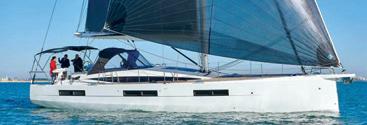










Hi Joe,
I thought I’d reach out and let you know we have a new boat build in progress here in Portland. It’s an 80-foot Wylie design being built by Steve Rander at our almost-toosmall facility on Tomahawk Island Drive.

Also, I enjoyed your editorial last month, and have shared in that enjoyment of the last shopping trip before the departure — always fun!
Mark McCuddyEngineered to be Serviced Easily!
Beta Marine West (Distributor)
400 Harbor Dr, Sausalito, CA 94965
415-332-3507
Pacific Northwest Dealer Network
Emerald Marine
Anacortes, WA • 360-293-4161
www.emeraldmarine.com

Oregon Marine Industries Portland, OR • 503-702-0123
info@betamarineoregon.com
Access Marine Seattle, WA • 206-819-2439
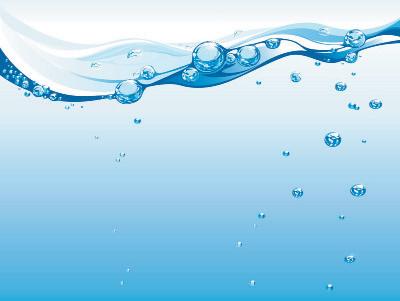
info@betamarineengines.com
www.betamarineengines.com
Sea Marine
Port Townsend, WA • 360-385-4000
info@betamarinepnw.com
www.betamarinepnw.com
Deer Harbor Boatworks
Deer Harbor, WA • 844-792-2382
customersupport@betamarinenw.com
www.betamarinenw.com
Auxiliary Engine

6701 Seaview Ave NW, Seattle WA 98117 206-789-8496
auxiliaryeng@gmail.com
Response to McKayla Bower Article in August Issue
Dear 48° North,
I am loving your publication and am excited to have it as my new home for sailing news now that I’ve moved to the Pacific Northwest after learning to sail on San Francisco Bay, reading Latitude 38, and cruising Mexico for four years.
I’m writing to offer my thanks for your article by Jennifer Harkness about McKayla Bower. The editorial note about the linguistic choice of trans woman and transwoman made my heart pound and my eyes fill with tears as a woman, a sailor, and a writer. Thank you for your respect, care, and grace in that choice and statement. Thank you for being willing to take an ethical stance and support our trans sister in her endeavors.
Fair winds to you!
Kristie Dahlia HomeCorrections to “Shifting Gears” Column from August Issue
A brief editor’s mea culpa: by no fault of the author, Dennis Bottemiller, we published several pieces of incorrect information in his “Shifting Gears” column last month. We referred to the boat as a C-Dory 25, but it’s actually a C-Dory 22. And though you can clearly see in the images that the primary outboard is a Honda, we called it a Yamaha in the article. D’oh! Apologies, Dennis.
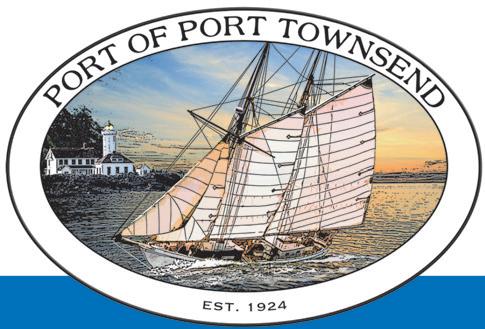

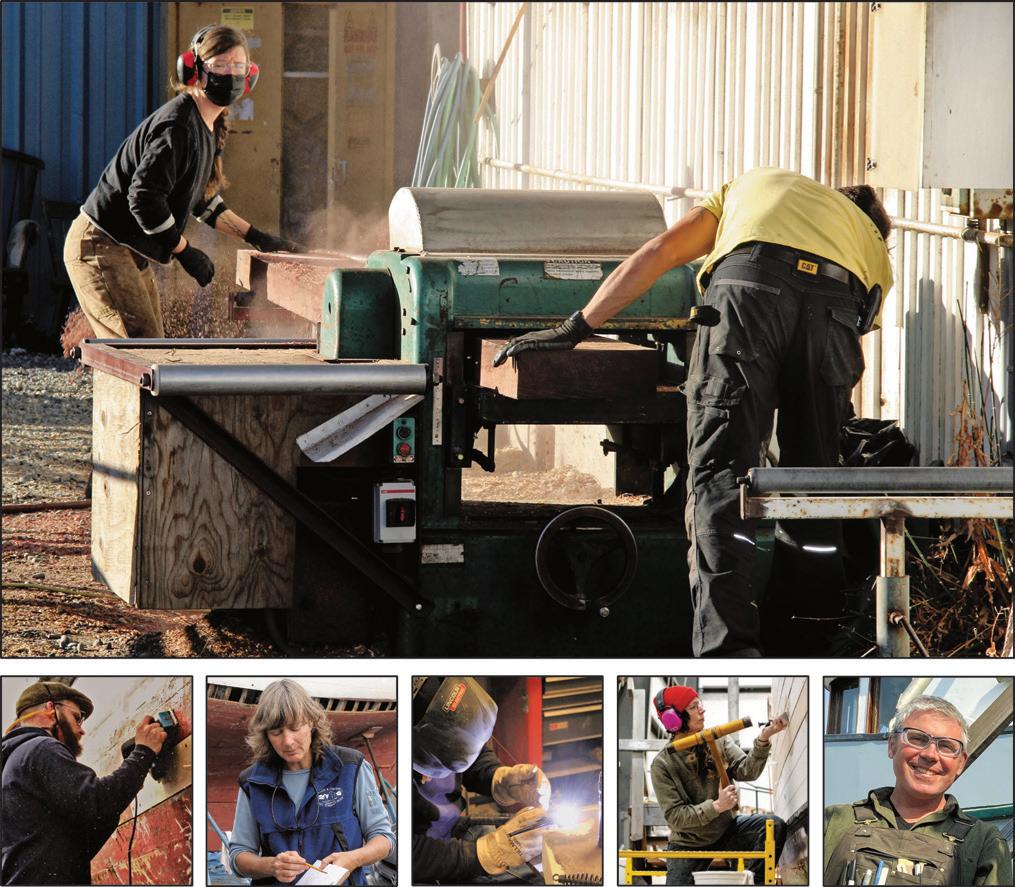


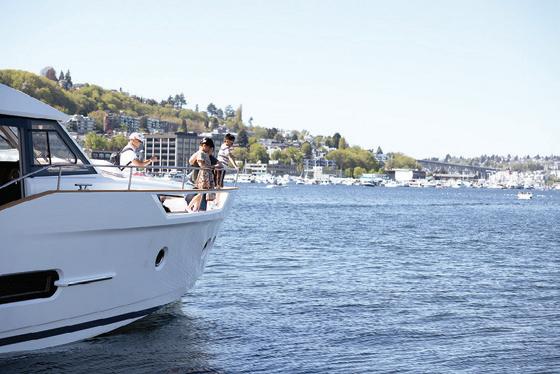
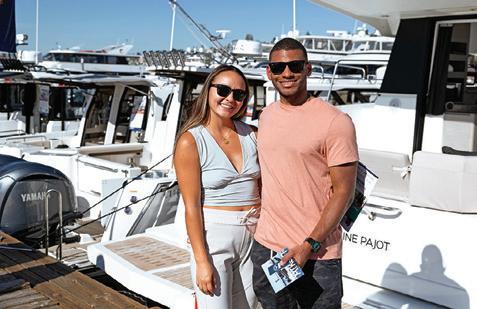
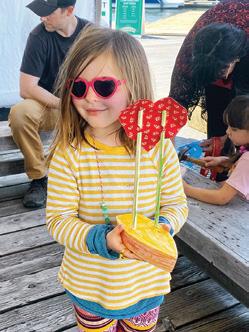

The Fall Boats Afloat Show arrives at Seattle’s South Lake Union September 14-17, featuring a world-class fleet of more than 120 power and sailing yachts and high performance craft, quality shoreside exhibitors, and a full line-up of activities. It is the largest floating boat show in the Pacific Northwest and is presented by the Northwest Yacht Brokers Association (NYBA).
A boating tradition since 1978, the show is a “go-to” opportunity to view spectacular craft from the U.S. and Canada and learn about the latest boating lifestyle and technology trends. Spotlighting luxury and performance “dream boats” in a variety of sizes, the region’s top brokers and dealers will be on hand to share information about the vessels they are representing.
The festivities include a variety of on-site dining options, plenty of beverage choices, and live music performances by top local talent each day.
For “newbie” sailors, Seattle Sailing Club will offer “Intro to Sailing” courses each day of the show. Advance registration directly through Seattle Sailing Club is required and includes admission to the show. The club will also provide free sailboat rides at the North Dock each day of the show.

Making its debut as the show’s non-profit partner, Salmon for Soldiers (salmonforsoldiers.com) provides free fishing activities for veterans and active-duty military personnel with a mission to reduce stress and create new relationships through boating and fishing. The Puget Sound-based organization will provide information and resources each day and showgoers will have an opportunity to show their support by purchasing raffle tickets for a variety of prizes, with all proceeds from sales benefiting Salmon for Soldiers.
Opening day (September 14) celebrates “Women’s Day” at the show and all women receive 50% off adult general
admission tickets (valid that day only; and if purchased online, a specific Thursday-only ticket must be purchased).
The show is open Thursday and Friday (September 14-15), 11 a.m. to 6 p.m.; Saturday (September 16), 10 a.m. to 6 p.m.; Sunday (September 17), 10 a.m. to 5 p.m.
Admission is $22 for adults 18 and over, $5 for teens ages 13-17, and free for children 12 and under. Tickets may also be purchased online, including web-exclusive discounted adult tickets ($20) and a multi-day “All Access Pass” for $35.
» www.boatsafloatshow.com
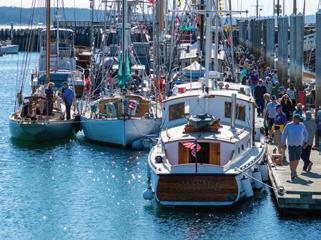
Every year hundreds of wooden boats of all shapes and sizes gather in Port Townsend for North America’s largest wooden boat festival. This year’s Festival, September 8-10, 2023, will feature boat races, special demonstrations, presentations, music, dancing, and no shortage of great food. The Wooden Boat Festival is a weekend of endless fun for all ages!
NEW THIS YEAR, FESTIVAL-GOERS WILL ENJOY:
• Headliner Arshay Cooper presents his film, “A Most Beautiful Thing” on Saturday night, followed by a Q&A. “A Most Beautiful Thing” is a 2020 documentary chronicling the history of the first US African American public high school
rowing team, composed of young men from the West Side of Chicago.
• Hands-on woodworking projects: make a wooden pen, cheese board, or small bowl; or practice dovetail joinery.
• At the new “Future of Maritime” area, you can meet leaders who are building a better, more inclusive, maritime industry.
FESTIVAL FAVORITES WILL ALSO BE AVAILABLE:
• More than 80 demonstrations and presentations.
• A myriad of ways to get on the water on sailboats, longboats, paddleboards, and more.
• Tons of family-friendly activities like kids’ boatbuilding, Gyotaku fish printing, and sea shanty sing-alongs.
• Great local music, bars, food and vendors.
• Hundreds of wooden boats to tour and thousands of wooden boat enthusiasts to meet!
The Festival runs September 8-10, Friday and Saturday from 9:00 a.m. to 6:00 p.m. with music and dancing until midnight, and Sunday from 9:00 a.m. to 4:00 p.m.
» www.woodenboat.org
If you’re coming into the United States from British Columbia by boat, the customs office at Roche Harbor Resort is no longer a staffed point of entry. US Customs & Border Protection strongly recommends using the CBP ROAM app to clear customs. CBP ROAM is a free mobile application that allows pleasure boaters to report their US entry to CBP via their personal smart device.
If Roche Harbor is your first stop after crossing the border, there are designated iPads in the unstaffed customs booth for reporting your arrival via the ROAM app. In circumstances where you are unable to clear via the CBP ROAM app, you may clear in person at Friday Harbor, Point Roberts, or Anacortes. However, in this case you must clear during business hours (8 a.m. – 8 p.m., mid-May to mid-September. The rest of the year 8 a.m. – 5 p.m., Sun-Sat. 360-378-2080), arriving at least 30 minutes before closing. Also, be aware that typically you will still be asked to clear via the CBP ROAM app while you sit on the customs dock.
HERE IS THE CLEARING PROCEDURE WHEN USING THE CBP ROAM APP ON YOUR PHONE/TABLET:
• At least 24 hours before you plan to clear customs, download the “CBP ROAM” app from the Apple Store or Google Play Store.
• At least 24 hours before you plan to clear customs, use CBP ROAM app to create login profile, sign into app and create mode of travel and traveler profiles. Then submit a trip by selecting your profiles and completing trip information.
• As soon as you cross the border line into the US (but not before), initiate a report of arrival via the app. A CBP officer may initiate a video chat and will send a notification of approved entry or next steps. Be prepared to divert to Friday Harbor, Anacortes, or Point Roberts if instructed.
The Northwest Marine Trade Association (NMTA) is pleased to announce the continuation of its Grow Boating grant program for 2023–2024, once again offering ten $1,000 grants to entities that help support its mission of growing boating in the Northwest.
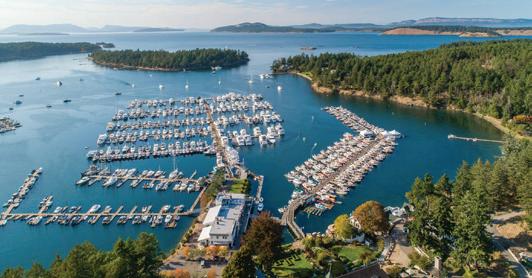
The application process is now open and closes October 31, 2023. Grants will be announced in December 2023 and funds will be distributed to grantees in the spring of 2024. NMTA’s Grow Boating program is funded by a portion of space rental fees collected by the Association at its Seattle Boat Show each year. Since 2003, the program has awarded more than $2 million to promote boating in the Pacific Northwest.
Applications must fall into one of the following categories:
• Youth Boating Grant
• Discover Boating Grant
• Boater Education / Safety Grant
More information about the grant program, types of programs funded, and the application can be found:
» www.nmta.net/grant
(Note that Roche Harbor is no longer an option for in person clearance.) Otherwise, once cleared, continue to your next US destination.
HERE’S THE PROCEDURE WHEN VISITING A US CUSTOMS DOCK (ONLY IF THE CBP ROAM APP IS NOT AN OPTION):
• Dock at customs dock. Crew may help secure lines but then must reboard and remain onboard until cleared.
• The skipper should bring the Customs Worksheet, charter agreement, and all passports to the customs office. Leave the ship’s papers on board. Make sure you have the number from the Customs User Fee decal, as well as your Canadian Customs clearance number entered on the worksheet. The Customs User Fee decal number tells Customs that you have already paid the entry fee (decal number on worksheet, actual decal attached to aft side of binnacle on sailboats, or by boarding gate or door on powerboats).
• After clearing, log your US clearance number on the bottom of the Customs Worksheet.
» www.cbp.gov/travel/pleasure-boats/pleasure-boat-overview/roam
The South Sound Maritime Heritage Association is proud to present a new addition to the 2.5-day Olympia Harbor Days Festival: a Friday (9/1) night 75-drone maritime light show over Budd Inlet, with a test rehearsal Thursday (8/31). Both shows start at 9:30 p.m. and are just over eight minutes long, projecting maritime images in the night sky. Carol Riley, Executive Director says, “Traditional festival hours for Friday have been extended this year to offer the public a Night Market which includes arts, crafts, commercial, and food vendors as well as extended illuminating entertainment and closing with the Drone Show.”
Olympia Harbor Days is the largest maritime festival in the South Sound. The free family friendly festival focuses on the tugboat maritime heritage of Olympia and includes the world’s longest running Vintage Tugboat Show and Races and this year includes workboats. The event features over 300 things to do and see including boats, bands, booths, food, kids activities, and more. The festival starts Friday, September 1 at 5 p.m. and continues through Sunday, September 3 until 6 p.m.
» www.harbordays.com/


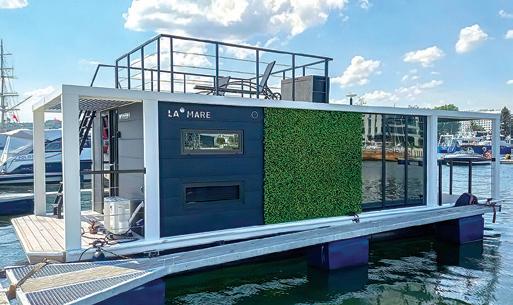







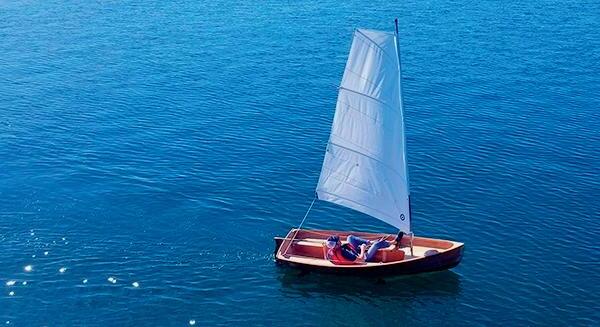

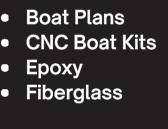


Having a handheld VHF radio aboard is a must in many situations on the water in the Pacific Northwest, but you don’t need to break the bank to stay safely connected. With their new Atlantis 155, Uniden continues their tradition of providing tough and reliable handheld radios at a good price. The 155 features all NOAA weather channels, as well as all USA, International, and Canadian marine channels. It also meets JIS8 submersible waterproof standards and has a bright backlit LCD display to make it easy to use, day or night in a variety of situations. Designed to float, the radio also features Triple Watch mode to monitor channels simultaneously, and Weather Alert Watch mode, which mutes the radio while it monitors a preset weather channel and sounds an alarm if there are broadcasts on that channel.
Price: $79.99 » www.uniden.com

Rocna’s well-known roll-bar anchor has recently undergone a major redesign that sets the bar high for those looking to upgrade their ground tackle. The new Rocna MKII anchor incorporates refinements to the original design, which has built up a reputation for reliably quick setting and high holding power over years of real-world experience and feedback from thousands of boaters. The MKII uses a patented technology shared with Rocna’s Vulcan anchor, the I+V™ shank, which helps make the Rocna MKII the toughest of all Rocna anchors. The MKII features an all-new patented Roll-Foil™, a sculpted variation of the original roll-bar that has a series of unique shaped profiles to further assist the anchor’s critical self-righting behavior and help during setting for deeper penetration and additional holding power. The anchor’s fluke also has had a major redesign which optimizes the original Rocna pattern for greater surface area and improved weight distribution.
Price: $2,036.99 » www.rocna.com
Perfect for the Pacific Northwest mariner or adventurer, Zhik’s new Tech Hoodie strikes the balance between comfort and utility. This essential hoodie delivers a combination of ultra-warm fleece and waterproof three-layer fabric for adaptable performance. Stylish yet functional, the hoodie has an active fit, three-layer paneling in the hood and upper sleeves to prevent wind and water spray from entering the jacket in these critical areas. The internal fleece provides warmth and allows body moisture to evaporate during vigorous activity. For extra protection, it can be worn under a waterproof shell or on its own in wind, light rain, and spray. The Tech Hoodie is available in men’s and women’s versions with three color options: Black, Platinum, and Provincial Blue.
Price: $159.99 » www.zhik.com
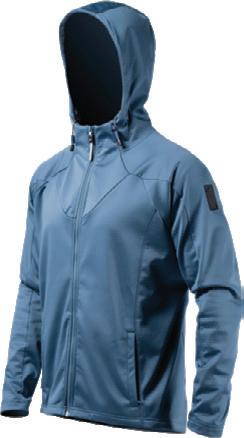





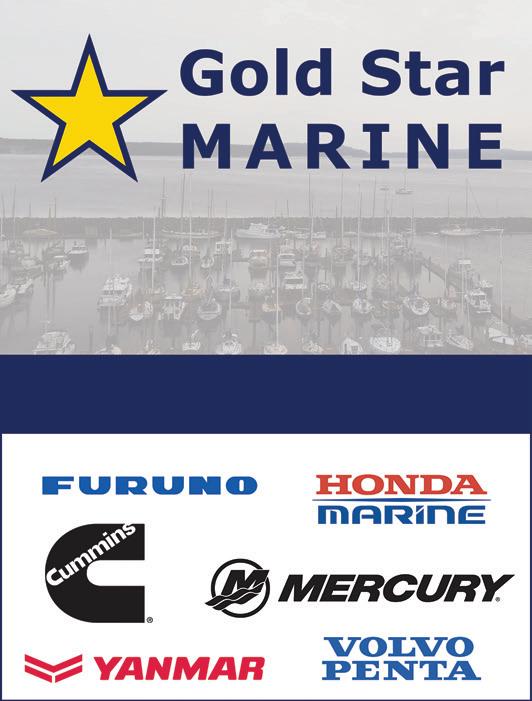




The world’s largest hourglass is at the Nima Sand Museum in Japan. It contains a ton of sand and is turned at midnight on December 31 each year.
Indonesia is the world’s largest coral reef nation, with about 18 percent of the world’s total, while Australia is a close second at 17 percent.
The world’s first sand hotel was opened in 2008 on Weymouth Beach in Dorset, United Kingdom.
Both the automobile and airplane were first launched on beaches.
1 Rudder control
4 Big waves
9 Arctic surface
10 Sail used when on a downwind course
11 Soaked
13 Jib, boom or gaff
14 Sunshine beam
15 Jet ___
17 Dangers in shallow waters, 2 words
21 Perplexed, at ___
23 Housings for ships’ compasses
25 Health statistic, abbr.
26 Bar order, initially
27 Minister’s title
28 Rushes of wind
30 Passing craze
32 Help in a crime
34 ___ sail: starts out on a sea adventure
35 Shuts, 2 words
1 Makes adjustments in a sailing vessel, 3 words
2 On the safe side, at sea
3 Where the sun rises
5 Blowing strongly
6 Water bodies
7 Gibraltar, for example
8 Cloud type
12 Popular hospital TV series
16 Albatross, e.g.
18 Citrus fruits
19 Calms
20 Exhausts, 2 words
22 To the rear
24 The N in NCIS
29 4x4 vehicle, for short
31 High exam scores
33 ___ Bice of American Idol fame
» See solution on page 50
Beachgoers worldwide unwittingly remove thousands of tons of sand from beaches every year through towels, swimsuits, beach chairs, shoes, between the pages of books, etc.
The most remote place on Earth is Point Nemo in the Pacific Ocean, named for the submariner in Jules Verne’s Twenty Thousand Leagues Under the Sea. It’s closer to the International Space Station than to any point on land.
Five of the world’s 10 highest waterfalls are located in Norway.
The Mediterranean island of Malta has no rivers, lakes, or streams.
The British Navy’s Astute Class nuclear submarine can detect a vessel leaving port 3,000 miles away.
The first underwater color photograph, taken in 1926, was of a hogfish in the Florida Keys.
Most birds have special patches of bare skin, called brooding patches, that transfer heat from their bodies to their eggs. Pelicans and some other seabirds, such as gannets, boobies, and cormorants, lack these and instead incubate their eggs with their broad, webbed feet.
THE POWER OF EDUCATION…
Bellevue Sail & Power Squadr on, we are AMERICA’S BOATING CLUB of BELLEVUE
LEARN—Improve your boating skills
Bellevue Sail & Power Squadr on, we are AMERICA’S BOATING CLUB of BELLEVUE
Bellevue Sail & Power Squadr on, we are A MERICA’S BOATING CLUB of BELLEVUE
• ENGAGE—Fun activities
THE POWER OF EDUCATION…
THE POWER OF EDUCATION…
THE POWER OF EDUCATION…
• LEARN Improve your boating skills
• LEARN Improve your boating skills

• ENGAGE—Fun activities
• CONNECT—Join us as we support our recreational boating community
• LEARN—Improve your boating skills

• ENGAGE Fun activities
• ENGAGE—Fun activities
• CONNECT Join us as we support our recreational boating community
• CONNECT Join us as we support our recreational boating community
• CONNECT—Join us as we support our recreational boating community
To learn more about Bellevue Sail and Power Squadron and our classes and seminars, please contact Commander Willa Conrad at willaconrad41@gmail.com
To learn more about Bellevue Sail and Power Squadron and our classes and seminars, please contact Commander Willa Conrad at willaconrad41@gmail.com
To learn more about Bellevue Sail and Power Squadron and our classes and seminars, please contact Commander Willa Conrad at willaconrad41@gmail.com
To learn more about Bellevue Sail and Power Squadron and our classes and seminars, please contact Commander Willa Conrad at willaconrad41@gmail.com Visit our website: Boating Classes | Bellevue Sail And Power Squadron | Bellevue (bellevuepowersquadron.org)
Visit our website: Boating Classes | Bellevue Sail And Power Squadron | Bellevue (bellevuepowersquadron.org)
Visit our website: Boating Classes | Bellevue Sail And Power Squadron | Bellevue (bellevuepowersquadron.org)
Visit our website: Boating Classes | Bellevue Sail And Power Squadron | Bellevue (bellevuepowersquadron.org)
To learn more about Bellevue Sail and Power Squadron and our classes and seminars, please contact Commander Willa Conrad at willaconrad41@gmail.com

Visit our website: Boating Classes | Bellevue Sail And Power Squadron | Bellevue (bellevuepowersquadron.org)


PREMIUM 48° NORTH SUBSCRIPTION
Become a part of the 48° North crew! In addition to your magazine each month, with this exciting new subscription offering, you’ll also be supporting 48° North in a more meaningful way. But, warmed cockles are far from the only benefit. Others include:
• Discounts at Fisheries Supply Co.
• One free three-day to the Port Townsend Wooden Boat Festival ($40 value)
• 10% off of Northwest Maritime Center classes excluding Sailing Club


• Discounts on registration fees for events
• Cool bumper sticker and decals.
• $75/year (additional fees for First Class forwarding or International)
JUST THE MAGAZINE, PLEASE:
Our standard subscription gets you 12 months of 48° North and its associated special publications (SARC, Setting Sail, and the Official R2AK Program).
• $39/year (additional fees for First Class forwarding or International)
We sat on our boat on a Friday in mid-July, dejectedly eyeing the weather forecast.
The weather had been perfect for the three weeks we’d spent in the Gulf and San Juan islands since leaving Bainbridge Island in late June, so the forecast of heavy rain the following Monday was an unpleasant surprise. Our plan for that day, and the main goal of our five-week cruise, was to finally get to a place we’d never seen but had heard so much about — Princess Louisa Inlet.
Our 20 years of sailing the Pacific Northwest together had taken us from Olympia to Alaska, many points in between, and on a circumnavigation of Vancouver Island last summer. But somehow, we’d never made it to Princess Louisa Inlet, a fabled fjord flanked by sheer granite cliffs plunging into the sea and forested mountains stretching up to 7,000 feet high. This summer, it was time.
Anchored in Pender Harbour on British Columbia’s Sunshine Coast, we briefly considered foregoing the Princess Louisa trip and heading back down to the islands, but ultimately decided to stick
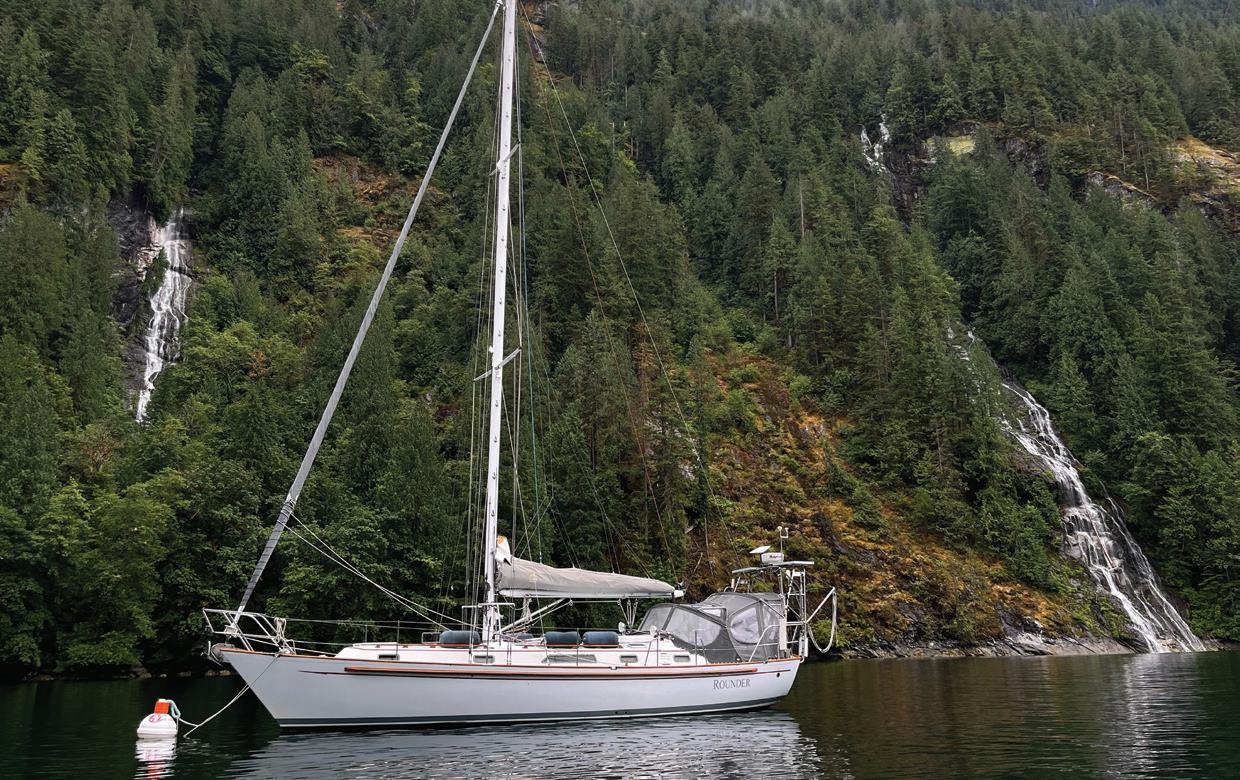
with our plan. I’d taken the week off work specifically to go to Princess Louisa, and if we didn’t go then, who knew when we might be able to again. Life is capricious, and the clock is always ticking.
That afternoon, we headed for Backeddy Resort & Marina in Egmont. We needed to refill our water tanks and do laundry, and figured it was a good stopping point to break up the otherwise long trip to Princess Louisa. But what was intended as simply a practical stop turned out to be one of the best surprises of our cruise.
Backeddy has a small, rustic marina with rickety old wooden docks, a friendly staff, and a low-key pub with a deck offering stunning views of Sechelt Inlet and the surrounding mountains. The place felt like a charming throwback to boating of decades past. There were no megayachts in sight. Power on the linear dock was via cobbled-together combinations of extension cords leading to the one set of outlets down the dock. Laundry (one washer, two dryers) was in an old but clean room in a cinderblock building at the back of the site. We ate
by Deborah Bachat the pub both nights, enjoying the live music and the vibe of what was clearly a favorite spot for locals, along with some tasty food.
And there was another pleasant surprise in store. The marina is about an hour’s walk from Skookumchuck Narrows, where around 200 billion gallons of water flow through the narrow strait connecting Sechelt and Jervis inlets twice daily, creating a mesmerizing display of roiling whirlpools and rushing waves. The very busy 2.4-mile trail to the narrows is along a relatively flat route in Skookumchuck Provincial Park through lush rainforest and leads to two viewpoints. Near the trailhead is Skookumchuck Bakery & Café, nestled into the woods in a charming wooden building with a covered wraparound deck and a stylish interior, so improbably located and perfectly picturesque it’s almost hard to believe it exists.
We left Backeddy at 4:30 a.m. Sunday to arrive at Malibu Rapids, at the entrance to Princess Louisa, at high slack tide. Morning dawned as we headed north, coloring the mountainsides pink and
revealing an increasingly dramatic landscape of ever-taller peaks. The entrance to the rapids — marked on the northwest side by Malibu Club, a Christian camp and retreat facility — requires a turn to port, then to starboard, before crossing through a narrow gap that feels like passing into another realm.
From the rapids, it’s nearly four miles to the head of the inlet and the famous Chatterbox Falls. Under overcast skies, we looked up at the soaring cliffs and steep forests, searching for the landmarks M. Wylie Blanchet describes in The Curve of Time, a memoir about her experiences as a widowed mother cruising the Salish Sea with her five children in a small boat in the 1920s and ‘30s. We reached the falls to discover the nearby linear dock, which holds about a dozen boats, completely full. We’d hoped the bad weather forecast might have discouraged other boaters, but no dice.
Instead, we tied up to one of five mooring balls just east of the falls. We’d been a little anxious about finding a suitable moorage, but we needn’t have worried — there were several places in the inlet where we could have safely dropped a hook. We dinghied ashore for some exploring, walking the short trail to Chatterbox Falls, which is accessible from the dock, and exploring another short trail on MacDonald Island, a little south down the inlet, where there were several more mooring balls.
Afterward, we headed back to the boat to relax and enjoy the beauty of our surroundings, our serenity occasionally interrupted by the growl of float planes and the drone of voices over loudspeakers on tour boats, instructing passengers about what time to return to the dock. Not surprisingly, Princess Louisa Inlet is popular. It’s comparable to places we’ve visited in Alaska and on the west coast of Vancouver, but its location on B.C.’s mainland makes it much more accessible — and therefore, busier.
As forecast, rain was pattering on the hatch above our bunk when we awoke the next morning. We’d prepared for a cozy day hunkered down below, with downloaded movies to watch, books to read, and food to cook. In mid-afternoon, when there was a break in the downpour, we stepped out on deck and found a place
One of several pleasant surprises about Backeddy Resort & Marina was its walkable proximity to witness the raw power of the tidal exchange at Skookumchuck Narrows.

magically transformed. Low-hanging clouds blanketed the inlet, drifting gently past the boats. Chatterbox roared, and close to a dozen other waterfalls had emerged around the bay. Our sailboat was now moored between two of them, one of which cascaded down into the inlet. We pulled on our foulies and dinghied over to the waterfall, putting our hands in the streaming water as spray misted our faces. That night, the rain tapered off and a bright moon glowed through broken clouds.
We left Princess Louisa the next
The entrance at Malibu Rapids must be timed right, and isn't for the faint of heart; but once you're in, Princess Louisa Inlet is spectacular.

morning, glad we hadn’t let the forecast ruin our plans. Our visit wasn’t the sundazzled experience we’d anticipated but was equally beautiful in a different way. It was a reminder that some of the best experiences, in cruising as in life, come from a willingness to keep an open mind and embrace the unexpected.
Deborah Bach is the co-founder of Three Sheets Northwest and a former newspaper reporter. She and her husband can often be found sailing with their boat kitty on their Passport 40, Rounder.
While I have yet to participate in a sailboat race, I have to admit that the idea is intriguing. However, as a new sailor and old owner of a sluggish sloop, I think that evening flotillas and weekend rallies are best suited for my current level of sailing ability. Even a slow afternoon cruise near our marina offers me an opportunity to learn something about sail trim and course headings.
At a recent club-sponsored sail rally, my wife, Laura and I found ourselves aboard Ariel, our 28-foot Columbia sailboat, as one of only two boats from our dock participating in the evening event. It was the kick-off date of the bi-weekly summer series, “Get Out and Sail”, with beautiful weather accompanying our first late afternoon sail of the season.
Though we were somewhat disappointed with the low turnout of fellow boaters, we realized that it really only takes two boats on the water for a race. The evening turned out to be a great opportunity to share our burgeoning love of sailing with an with an experienced and supportive club member who gave us a lesson on sail trim.
We left the marina about 5:30, just behind Xocomil (pronounced “Zoco-mill), a C&C 37/40, with skipper Rob Nettleton at the helm. After smoothly raising our jib and main, we were fortunate to maintain the same course within earshot of the swift yacht for the better part of an hour, mostly because of Xocomil’s self-imposed handicap. Rob was solo-sailing with just the jib in the 6-8 knot winds. Although from the size of the gray carbon-hybrid sail, he had about as much canvas catching the cool evening breezes as Ariel’s jib and main combined.
Our old but dependable boat, along with my inexperience, were no match for Xocomil’s speed and genoa, but it didn’t stop us from enjoying the unofficial race to a shoreline buoy in the southern end of Commencement Bay. Rob made a tight turn with a smooth tack around the marker, demonstrating how it’s done without having to utter a word.
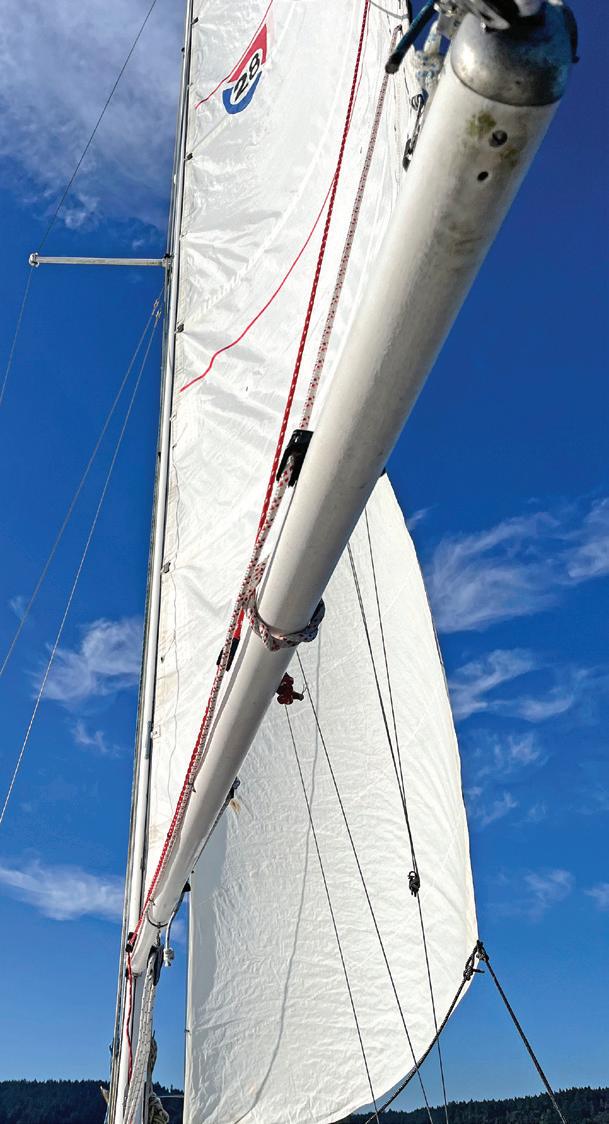 by David Casey
by David Casey
But in the spirit of nautical camaraderie, after rounding the mark, Rob went on to explicitly share some of his expertise with us by shouting out suggestions for trimming Ariel’s sails as he observed Laura and I in his wake, or, after sailing circles around us, just off his port bow.
“Tighten the headsail a bit,” he advised, in a calm voice that cut across the quiet waves between our two boats. With Laura at the helm, I pulled in the sheet, closing the gap between the two sails of our 1975 vessel.
From my vantage point in the cockpit, the shape of the headsail appeared to be more planar than the billowed main. I was under the impression that the jib and main should possess “parallel” curves, when viewed from above. But Rob’s observation made me pause.
When friends with longtime sailing experience have come aboard they usually instruct me in referencing the telltales on the trailing edge of the main, along with the Windex atop the mast.
Those two indicators help me set the main sheets and traveler in conjunction with the course heading.
But since our jib has no telltales, I usually adjust it with the sheets alone, setting its curvature and location by eye, which has suited me well enough in the brief time that Laura and I have been sailing.
I’ve since done some research on trimming the sails. While not as effective as direct experience on board Ariel or any other sloop for that matter, reading about sail placement has given me some working knowledge to apply when making adjustments.
As with so many nautical aspects, the more I read about head sail trim, the more I realize how little that I know. But using some of my knowledge from teaching high school geometry for over 30 years, I was able to at least understand some of the basic components as I continued studying.
Since the “center” rotation point of the jib and main, when viewed from above (the forestay and mast, respectively) are a good distance apart where they meet the deck, my initial concept of concentric curves is not really applicable, especially since both sails flatten out toward the aft end of the sail.
Skipper Rob was able to observe three ”curves” of the jib: the trailing edge, or leech; the foot from the tack to clew; and the draft, or “pillow-shape” of the sail.
My inexperience directed all of my attention to the adjusting trim with the sheet, which affects draft and shape in a macro sense. How and why to adjust the other two characteristics of sail shape hadn’t really occurred to me.
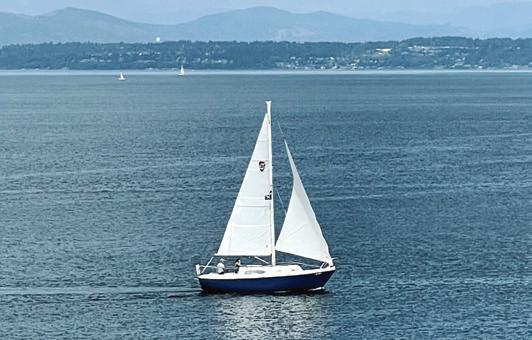
I now understand that moving the jib block slider car aft produces a more linear foot; moving it forward pulls downward, creating a more linear leech, but a bigger pillow shape, or draft.
And, continuing with my research and lessons from other sailors, I began to understand the role of the main sail location, and its potential effect on increasing the driving, or lifting force of the jib. It makes me wonder how much faster Xocomil could have cut through the water had Rob chosen to hoist it.
The main can “squeeze” the airflow on the windward side of the jib and, when properly adjusted, create what I learned is called the Kutta condition, named after Martin Kutta, a German mathematician. The ideal condition occurs when the airflow or wind leave the trailing edge of an airfoil or sail smoothly, essentially following the same curvature path as the trailing edge.
But despite my newfound awareness of nautical airflows, it’s still early in my partnership with Laura and Ariel to spend too much time fussing with sail trim, jib blocks, and leech lines. In the meantime, until I install telltales on the jib, Ariel’s heading and sail trim will be my focus, along with avoiding debris and other ships during our journey.
On our return leg to the marina, a massive tanker was in the path of the shortest route to the “finish.” We could head to port and squeeze between the tanker and the shore close-hauled on starboard tack. Or we could head to starboard of the tanker on a beam reach, and upon clearing the massive ship, come about onto starboard tack to our marina.
Wanting to stay close to shore and knowing that our engine could take us home at any time (it wasn’t really a race, after all), Laura and I opted for the first option closer to shore, while Rob, who was about a quarter mile ahead of us, chose to sail the reach
taking him farther north of the marina.
As the wind picked up a knot or two and the sun set behind the forested hills of Point Defiance Park, Ariel was holding fast on her course, with the jib sheets about as tight as I figured was reasonable. I sighted Xocomil once we were past the freighter, now heading to the marina on a starboard tack. By my estimate, her course appeared to put her just a bit behind that of Ariel’s, maybe due in part to the effect of the massive ship that divided our courses.
With our two boats closing in on the marina, my decision to take the route toward the shore gave me a slight advantage. It turned out that the massive tanker did create a bit of a wind shadow for Xocomil, slowing her just enough for Ariel to gain on her by the time we approached our destination.
Feeling confident and satisfied with our evening sail, Laura and I dropped the jib and flaked the main, cruising into the marina just ahead of the Xocomil, with her effective and powerful genoa now furled.
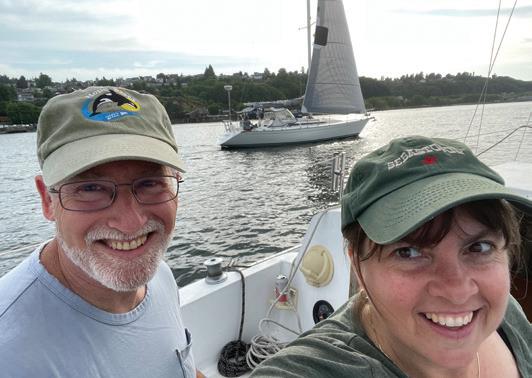
After tucking Ariel into her slip, we walked across the dock to Xocomil and expressed our gratitude to Rob for his mentoring and kindness. He had given me and Laura the boost we needed to feel like maybe we might be sailors after all. And who knows, after a few more informal regattas like this one, maybe I’ll even sail across a real finish line someday, with telltales streaming on the jib, and a well-set draft on the main.
David Casey is a retired math teacher and semi-professional woodworker and bass player. He plans on using his retirement to build a small sailboat and a kayak, and to explore the waters of southern Puget Sound.
Ihave always been an excellent armchair sailor. Before any major voyage, I scour bookstores, websites, libraries, archives, and friends’ bookshelves. Sure, I’ll pick up cruising guides, nature studies, or an occasional history – practical reads for information and background – but I really relish the nautical narratives that are part memoir and part travelogue. The best of these first-hand accounts capture the magic of a destination, connecting readers to the voyagers and their vessels that have gone before us. I brought several of my favorite narratives, some of which are Pacific Northwest classics, on a recent cruise through British Columbia with my husband Frank and our friend Alan.
Fortunately for me, they love books, too, and were tolerant of the small library I brought on board. As three sailors that chartered a 42-foot Grand Banks trawler for several weeks, we were almost giddy about the ample space available. We filled two shelves with books (and yes, I have a Kindle). During our trip, I discovered that nearly everything we experienced could be found in the pages of our books on board. After all, they are classics because they resonate with readers, who recognize their own adventures in these voices from the past.
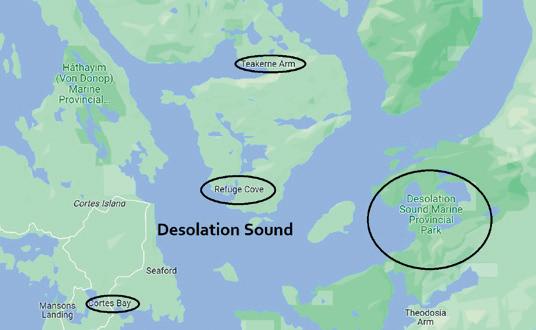


Like countless boaters before me, I was awestruck when our trawler approached Desolation Sound. “No matter how many times you see it,” Alan commented from the helm, ”it has that effect.” In a region known for spectacular scenery, Desolation Sound stands out, with multiple fjords cutting long and deep through steep, jagged mountains that plunge to a vertical shoreline. The blues and greens are vivid here, and because we arrived in May, early in the season, snow still accented the highest peaks. The weather could not have been better. Each day brought bright sunshine and warm breezes, allowing for incomparable long-distance views. Teakerne Arm, with its thunderous waterfall dropping straight into the sea, was a highlight of our visit to the area and we were able to maneuver our boat right up to the spectacle.
Yet I was reminded (since we carried his journals on board) that Captain George Vancouver reacted differently to all this splendor. While anchored at Teakerne Arm in 1792, Vancouver surveyed the scene and pronounced it desolate. “This Sound afforded not a single prospect that was pleasing to the eye,” he complained. At one point he grumbled that the “roaring of
the falling cataracts” made it impossible to hear anything else. One of our books, Jonathan Rabin’s Passage to Juneau: A Sea and Its Meanings (1999), explained Vancouver’s foul mood: the weather was rainy and dreary, for instance, and Vancouver had been frustrated in his attempt to locate the Northwest Passage among the many dead-end inlets of the area. Rabin, however, dug deeper, noting that Vancouver lacked the poetic sensibilities of some of his more educated shipmates, who were familiar with the concept of the “Sublime” — a new movement in 18th-century art and literature that celebrated the craggy peaks, swirling mists, gnarled trees, and churning waters of the wild. Vancouver seemed to prefer the tame, pastoral landscapes not found in Desolation Sound. Rabin’s book made me realize that my view of this beloved cruising destination has been shaped by cultural forces, including tourist promotions and fellow recreational boaters who have raved for decades about this postcard-beautiful marine park. Whatever the reason, I now join all those cruisers before me in singing its praises.
We found it easy to appreciate scenery when cruising on a trawler with abundant food in the pantry, refrigerator, and freezer. Accustomed to our 26-foot sailboat with its small ice chest, Frank and I marveled at the meals we were able to prepare on board our chartered Grand Banks: truffle risotto with glazed ham; barbecued chicken and potato salad; steamed broccoli and carrots; and a variety of soups. Whereas Vancouver worried continually about replenishing the stores on his Northwest voyages, we spent evenings eating ice cream on the fly bridge while at anchor.
Our most memorable meal came from the oysters harvested and grilled on the shore of Cortes Bay in Desolation Sound. Frank and Alan gathered the shellfish while I scanned the scene with my binoculars, watching a pair of black oystercatchers — birds with long, brilliant orange bills — poke around on the rocks next to them. I spotted two boats bobbing in the distance and quickly guessed why they were there: orcas! Their large black dorsal fins broke the surface of the water every few seconds. It seemed everyone was on the hunt that morning.
Back at our boat, I stumbled on an eerily relevant passage in Vancouver’s 1793 journal describing how some of his crew “breakfasted” on roasted mussels in B.C. waters. John Carter, one of the men, became violently ill and died a few hours later. “There was no doubt that this was occasioned by a poison contained in the mussels he had eaten,” Vancouver wrote. He named the “fatal spot” where the shellfish had been taken Poison Cove. I repeated this tale as Frank and Alan walked up the dock with their pail of oysters. “Yikes!” they responded, and proceeded to shuck them anyway. Still, we felt sad for John Carter and hoped to avoid his fate.


Frank purchased the ingredients for his oyster sauce at the Refuge Cove General Store. A visit to this rustic building, located on the southern tip of West Redonda Island, seems to be a rite of passage for cruisers in Desolation Sound. Reached by a long wooden gangplank and surrounded by structures sagging with moss, it has an early waterfront vibe that has not changed much over the decades. Grant Lawrence, author of the lively memoir
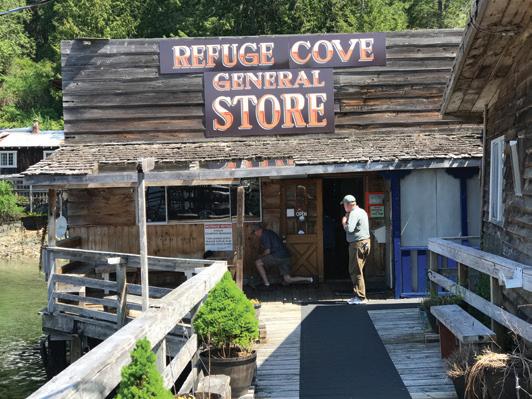
Adventures in Solitude: What Not to Wear to a Nude Potluck and Other Stories from Desolation Sound (2010) lists the store as a favorite spot. We arrived in our trawler before it opened for the season. “Have faith,” Alan said as we approached the dock. He was right. The proprietor allowed us to peruse the mostly empty shelves as we happily selected a few dusty bottles of wine and some hot sauce from last year’s inventory.
We rarely encountered other boats. For a while, we had Melanie Cove, a gem of an anchorage in Desolation Sound Marine Provincial Park, entirely to ourselves. Yet many classic stories suggested that the character of this region has been defined by people. Ironically, Lawrence’s Adventures in Solitude devoted most of its pages to describing the locals he met during his years in Desolation Sound. These included an assortment of oyster farmers, loggers, aging hippies, nudists, dreamers, and a gun-toting “cougar lady.” Summers always brought “a twomonth population boost from adventure-seeking tourists in yachts, sailboats, and kayaks” (some of whom may be reading this magazine right now). These folks made Lawrence’s book worth reading. If you are looking for humorous, irreverent tales of Desolation Sound’s inhabitants that include a deep sense of place, this is the book for you. Spilsbury’s Coast: Pioneer Years in the Wet West, by Howard White and Jim Spilsbury (1987), is also worth a look for its vignettes of the region’s “wild animals and wilder people.”
Muriel Wylie “Capi” Blanchet’s The Curve of Time (1961) remains my favorite BC book, partly because of her description of 20th-century residents. So popular is this memoir that our charter company provided it on board. We consulted its pages repeatedly during our journey, often reading passages aloud. It recounts the summer trips that the widowed Blanchet and her five children took along the inland waterways in the 1920s and 1930s. In some ways, their explorations in a 25-foot powerboat seem closer to Vancouver’s experience than ours today, given their lack of GPS and other technological advances, along with the need to accommodate a large crew in very limited space. Perhaps the biggest marvel of Blanchet’s travels is how she managed six people and a dog on a 25-foot vessel for months.
Her characters included Mike Shuttler (also described in Lawrence’s book), a rough-hewn logger turned hermit philosopher who had settled on the shores of Melanie Cove. Mike, who reminded Blanchet of Don Quixote, planted apple trees and filled his rustic cabin with books that he would discuss with just about anyone. “He talked and tried to explain his ideas to the old Frenchman in [nearby] Laura Cove – old Phil Lavine,” Blanchet recalled. Phil could not read or write and appeared unreceptive, but when Mike died his books ended up on newly built shelves in Phil’s cabin.
Frank and I dinghied along the shoreline of Melanie and Laura coves, looking for remnants of these cabins. While we thought we saw a terraced landscape and some cultivated plants, we did not notice any structures. Few traces remain of the settlements that Mike and Phil had carved out of the wilderness. Even so, it was easy to imagine them rowing through these same waters that now carried our inflatable.
Desolation Sound is located in the traditional territories of the Tla’amin, Klahoose, and Homalco people. Blanchet pointed out that Indigenous canoeists had paddled the waterways of the Salish Sea and north coast for thousands of years before settler colonists appeared. Native fishers “still make these dugouts” from cedar, she observed. Continuity between past and present was a major theme in The Curve of Time, and Blanchet felt connected to early inhabitants as her boat probed deep into inlets and channels, getting “lost somewhere down the centuries.”
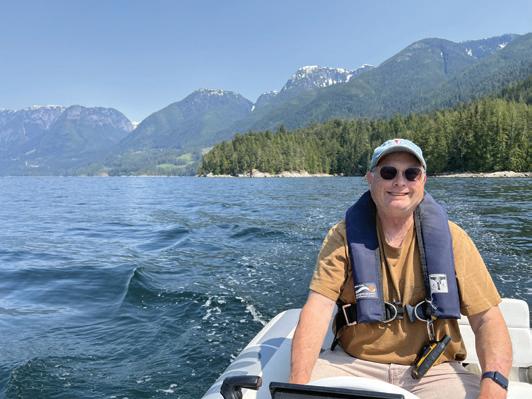
Frank and I often joke about a rule on our boat: no seaweed on the windows. We woke at our moorage in Vancouver to a strong wind warning for the Strait of Georgia, which we knew could complicate our trip south to return our chartered trawler. Our navigation software advised a delayed departure. We went anyway. The Strait of Georgia, which had been smooth as glass during our trip north to Desolation Sound just a few weeks earlier, now unleashed a fury of breaking waves and gushing foam in all directions. Reluctant to risk turning around, we plunged ahead, with Alan standing steady at the helm and Frank keeping watch while bracing himself with both arms to remain

standing upright. Me? I sat whimpering to myself, trying to grab the chairs — furniture that now seemed more suited to a land house than a boat — as they flew around the salon. Eventually I crawled along the floor, laying everything flat.
At one point we watched in horror as an entire tree went roiling past. It was a formidable specimen, with a robust trunk, elaborate root structure, and full branches. Momentarily I was distracted by the bizarre sight. We were accustomed to seeing logs, but how did a whole tree end up out here? Several hours later we arrived at a dock, and when I climbed gratefully out of the boat and glanced up, I saw it: seaweed on the windows.
Many boaters have similar stories from the Strait of Georgia. I remembered that Rabin encountered heavy seas while cruising through B.C. and found the section describing the 5-foot waves he fought in Malaspina Strait, which runs parallel to the Strait of Georgia between Texada Island and the mainland. “It was plenty rough enough for me,” he recalled in Passage to Juneau “I had no choice but to stick to my course” or risk “serious violence” from wind and sea on the beam. Suddenly he was cheered to spot an open fishing boat carrying two men ahead in the distance. “Their black silhouette, rising and falling, became my friend,” he wrote. “We were in this together.” If they could take it, so could he. “They couldn’t know how glad I was to share the water with them,” he mused, hoping to pass close enough to wave. Just when he reached the fishermen “the sea raised them high into the sunlight on the gathering crest of a big wave.” To his surprise, Rabin realized that this was not a boat but the fragment of an enormous old-growth Douglas-fir with
two thick branches protruding from the trunk. With its “trailing skirt of roots, this serious hazard to navigation could have sunk a tugboat,” he concluded.

Like Rabin, we were lucky that our tree did not hit us. And like Rabin, I found comfort and inspiration in the idea that others similarly have cruised through rough patches. Such experiences become boating stories, which, when shared, connect us all.
Lisa Mighetto is a sailor and historian living in Seattle. For the cruise described here, she is grateful to Alan Newell – skipper, mentor, friend, and generous supplier of books.



Readers of 48° North surely recall Lauren Upham’s previously published stories of cruising the Salish Sea, baking sourdough onboard, and bringing their newborn daughter on her first cruise. In summer 2023, this young family hopped on their J/40 Velella and went farther north. Here’s a vignette into their cruising life, as they pass British Columbia’s storied Cape Caution and have an extraordinary wildlife experience in Eucott Bay.
It’s our first rainy day, so I thought I would finally get around to some writing. I’m hiding, nice and toasty, down below as Ches sits up top all bundled in full foulies. We’re approximately a quarter of the way into our trip and have made it up past Cape Caution and are cruising in the channels around King Island before heading to Shearwater, near Bella Bella, around June 9.
Yesterday, we ventured up to Ocean Falls for a stay at the dock there. We shoved off in a morning downpour that was apropos, and the dinghy is going to need to be bailed out tonight. The few local residents who live there refer to themselves as “the rainy people” — there’s even a book with that title about the town. Ocean Falls is a small town, now mostly abandoned since the sawmill shut down back in the 1980s. It has a big hydro dam that supplies power to surrounding towns (and so much more that locals have taken up power-hungry bitcoin mining). We took our dog Laska up to Link Lake, which feeds the dam, for a nice freshwater swim.
It’s been a gorgeous trip so far, with mostly sunny days — until now, at least. It started with a lot of beating upwind or motoring since winds were on the nose the whole way up the Strait of Georgia and again in Johnstone Strait. We took our time coming up Johnstone Strait and stopped at some gorgeous spots we hadn’t been to before like Forward Harbour, and were so happy to go visit the Octopus Islands again.
We stopped in Alert Bay for a night before heading to Port Hardy for our final provision and top-up to prepare for the rounding of Cape Caution. Port Hardy was much the same as last time we were there when we circumnavigated Vancouver Island in 2021. This time we stayed at the Quarterdeck Marina instead of the Fisherman’s Wharf. The docks were a bit neglected and, talking with a local resident who keeps his boat there, the new owners weren't looking to put much money in for repairs and renovations. One of the dock boards near where we tied up was so rotted that I fell through as we were casting off to leave. I still have some nasty bruises on my thighs where I
ended up straddling the board. We met a couple other people headed north, too, including a family who is heading to Haida Gwaii as well, so we're hoping to see them again.
We took a couple days to jump closer to Cape Caution as we waited for our weather window; anchoring in the Deserters Group, a small chain of islands in Queen Charlotte Strait, which was an idyllic spot for taking out the paddle boards while the wee one, Vela, was napping.
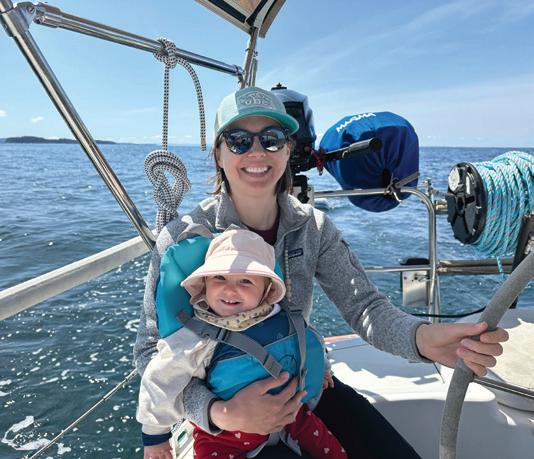


We spent the next night in Skull Cove and got up in the morning to round Cape Caution, with a nice southeasterly breeze. Winds were a bit light initially, as we joined the procession of other boats
taking the same weather window, but soon built so we were able to fly the chute and enjoy a gorgeous sail. Vela decided she didn’t want to nap, unfortunately, so I spent a big chunk of the day down below trying to settle her, but still got to enjoy parts of the sail!
Since rounding Cape Caution, we have bopped our way up Fitz Hugh Sound and Fisher Channel, stopping in Penrose Island Marine Park and Kisameet Bay. We tried some crabbing at both and shrimping at Kisameet, both unsuccessful except for an undersized spider crab and a hermit crab that were both thrown back. Next, we are headed to Eucott Bay to hopefully get a soak in the hot springs there.
We don’t often stay in one spot for more than a night, especially when we are on the hook, but we decided to go against the norm in Eucott Bay and boy-oh-boy are we glad we did. Sitting in the cockpit, we enjoyed the clear evening skies and late sunset, both of us agreeing that this may be the most beautiful place we’ve been.
What drew us to Eucott Bay is the hot springs and the promise of Yosemitelike scenery all around the anchorage, and those two things did not disappoint. We arrived in a downpour, but even with the clouds and fog, the mountains surrounding us were stunning. A long waterfall cascaded down one of the
snow-capped mountains to port when we entered the bay and Ches scoped out dream climbing routes with the binoculars on the Half-Dome-esque feature that towers over the anchorage.
Ches paddled over to the hot springs to check them out when we arrived and declared the tub the perfect temperature. We planned to take turns taking a quick dip later that night after Vela went down. The rain finally stopped, and we had a cozy dinner down below. Ches ventured out on his paddleboard again and I settled Vela down to bed. By the time she was asleep and I popped up top, I could see him on shore getting back on his paddleboard to head back. “That was quick,” I thought. I climbed over the lifelines onto my board and paddled out to meet Ches where he was chatting with one of the other boats anchored nearby.
As I got closer, I realized they were watching a mama black bear with three cubs clambering around on the rocks on shore. When I joined them, Ches pointed out to me the other bears, brown in color, at the head of the bay. He never made it in the hot springs (other than to dip in his toes), before deciding that there were too many bears around for relaxing in the warm pool.
We paddled closer to the head of the bay to observe the other bears, which turned out to be grizzlies. We watched them romp around and munch on some tasty morsels on shore before we returned to Velella.
The next morning, the sun came out and the beech tree lined shores felt like we were on a lake in the Midwest in July. Except for the 16-foot tides, mountains, and grizzlies. We watched the couple from the neighboring boat row in for a long soak in the hot springs, during which we spotted two more grizzlies a safe distance down the beach. A little bit later another grizzly lumbered out on the shore closest to where we were anchored. We tried to take photos using the binoculars as a makeshift telephoto lens and lamenting our lack of photography equipment.
Our tentative plan was to visit the hot springs after our neighbors returned, bringing Vela in the backpack and Laska on a leash, but all the daytime grizzlies were making us uneasy. Ultimately, we decided to leave Laska behind since she would be the most trouble if we had to make a fast getaway and we waited for the two grizzlies closer to the hot springs to wander off before we headed to shore.
The man made pool of stone and concrete at the hot springs was the perfect temperature. A previous visitor had plugged the input pipe so it was just a trickle, reading the guide books and comments on Navionics, it is way too hot if the pipe is pumping water in full stream. Vela waited patiently in the backpack for us to have a somewhat relaxing soak, with our eyes peeled for ursine visitors. Luckily, none arrived and we rowed safely back to Velella in time
for Vela’s afternoon nap.
I’m sure we will add to the count, but so far, we have spotted 16 bears; some of them could be the same bear coming back multiple times, but still, that’s a lot of bear action! We’ve also seen several bald eagles, a mink, and some harbor seals, but who even cares about those when there are bears afoot.
We don’t want to leave. If we don’t show up back in Vancouver, you’ll probably find us here in Eucott Bay. If someone could bring Ches his climbing shoes and a chalk bag, it would be greatly appreciated.
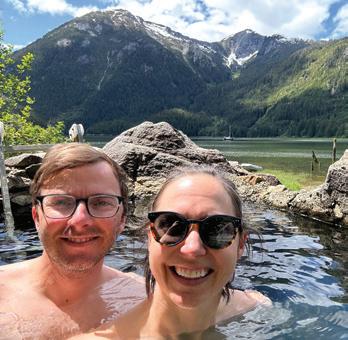
Lauren Upham and her husband Ches call Vancouver, British Columbia home. They cruise frequently on their J/40 Velella with their daughter, Vela and golden retriever, Laska




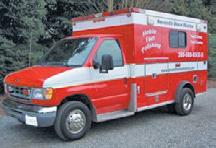

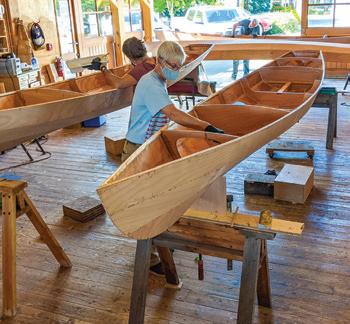
Afamily cruising a classic wooden tug tries to transit a storied Pacific Northwest passage. The author’s childhood remembrance provides a valuable lesson for us all.
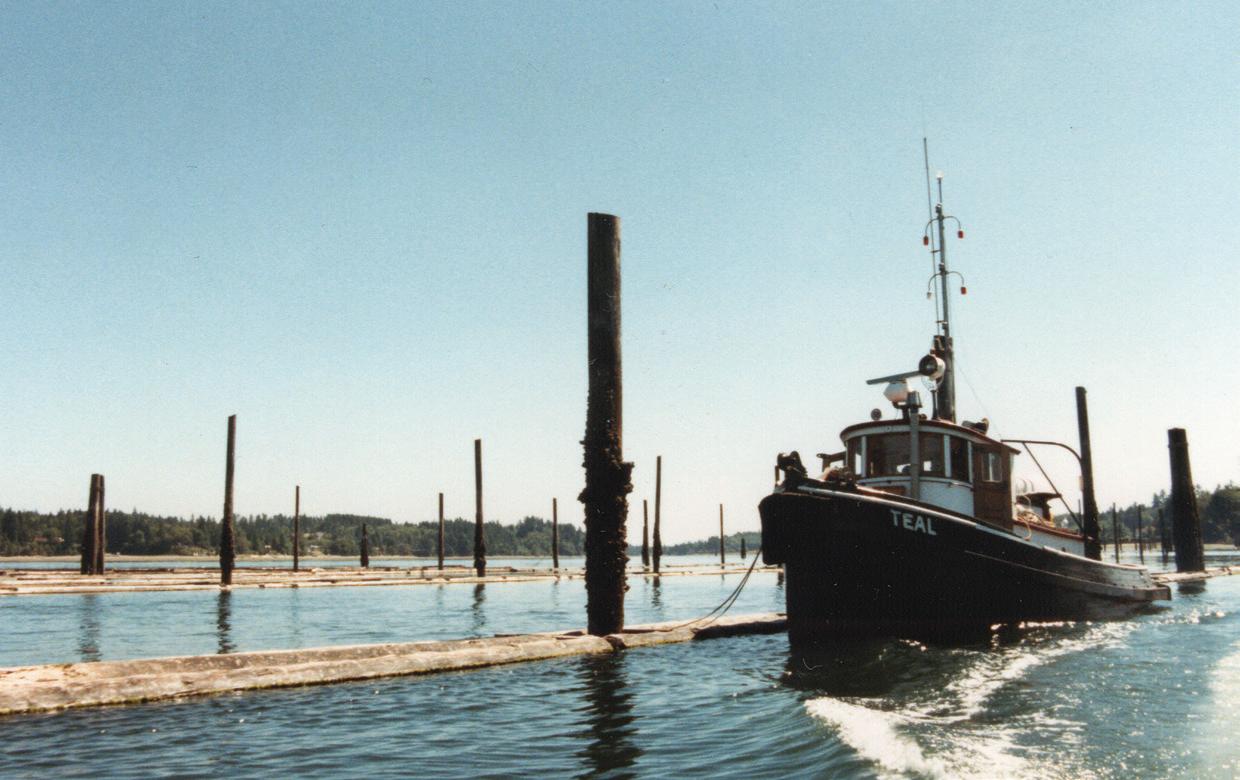
My father, Captain Don Leonard, climbed out of the noisy engine room of our 1949 wooden tugboat, Teal, and onto the back deck. He removed his earmuffs, but the engine’s idle was all he could hear. As always on the boat, though, his other senses were attuned to the world around him. He felt the morning sun warming his arms and face as he gazed around the pristine wilderness of Orcas Island’s West Sound. He took a deep fir-and-salt-scented breath while scanning the calm bay’s mirrored image shoreline. Our family was wrapping up a weeklong International Retired Tugboat Association vacation at Pete Whittier’s mansion.

Dad watched the other tug owners bustling around their vessels stowing gear and preparing to depart. His engine sang along with other warming tug engines. They’d all made plans to leave and cruise in and around the San Juan Islands in small groups of two or three while working their way home to various ports around Puget Sound.
Dad smiled to himself as he reflected on the past week. He and my mother, Linda, and my adolescent brother Charlie and I had gotten to tour Pete’s sprawling home and seven guest houses, swim in the heated swimming pool, admire his personal herd of
buffalo, walk on countless old growth forest trails, and catch up late into the night with our favorite tug boating friends. It had been a wonderful week, but it was time to leave.
Mom walked down the side deck to Teal’s stern where Dad stood. She lightly touched his shoulder. He shook his head ever so slightly, bringing himself back to the present. He smiled and turned to her. “The kids are stowing gear on their bunks. The galley is all clean and prepped for travel,” Mom announced over the rumble of the tug’s massive engine.
“Clancy’s warmed up and ready to go,” he declared. Clancy, the endearing name Dad had given the D-343 Caterpillar engine that was Teal’s rumbling beating heart.
“Have you plotted the course you and Paterson will be taking to Deer Harbor?” Mom inquired.
“Yep, it’s definitely a short cut, like Paterson said. We’ll have to really watch our depth and the current. With this outgoing tide, the current will be strong and against us, and Pole Pass is the narrowest pass we’ve ever navigated through,” Dad answered knowingly, feeling a tinge of worry squeeze the oatmeal breakfast in his stomach. Dad was a licensed captain, and his preparations had been rigorous, plotting a course with compass headings on the chart he kept laid out on the pilothouse bench for handy reference. Still, there are unknowns in any new passage and this was in the days before electronic navigation.
Robin Paterson and his wife, Kae, owned the 50-foot wooden British Columbia tug, Winamac, built in 1912. Although Paterson was a seasoned skipper, he did not have his commercial captain’s license. Even so, Dad trusted Paterson because of his years of salty experience in and around Puget Sound. The two families were longtime tug friends and often cruised together.


Charlie and I popped out of the pilothouse. “We’re done,” I informed my parents, all our gear was cleaned up and stowed on their bunks.
“Ok, we’re all set then,” Dad stated. “Charlie, hop over to the Winamac and tell Mr. Paterson we’re ready to go.”
“Okie-dokie!” Happy to help, young Charlie was over Teal’s varnished ironwood caprails and onto the Winamac’s deck before he finished his answer. He bounded back aboard our boat seconds later.
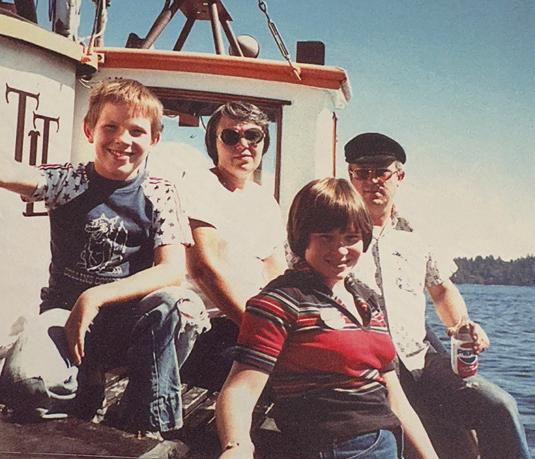
Paterson stuck his head out of his wheelhouse and called out over the roar of the engines, “We’re all set. Let’s cast off our lines. I’ll set Winamac at her usual 6-knot cruising speed and you guys follow us.”
“All righty, we’ll follow you,” Dad answered as courageously as he could, knowing the transit would bring them through unfamiliar waters. Our family had previously visited Deer Harbor in our smaller pleasure boat. Even with past experience of the pleasant Orcas Island port, this would be our first-time arriving by way of Pole Pass.
Full of submerged boulders of all shapes and sizes, Pole Pass was the fastest and shortest route from West Sound to Deer Harbor. The narrow width of Pole Pass (approximately 150 feet wide from shoreline to shoreline, depending on the tide) sat sandwiched between a southwest peninsula of Orcas Island and the largest of the Wasp Islands — Crane Island. Captains shared tales of Pole Pass’s mutinous currents. With an outgoing tide,
Former owners
and
the saltwater current rushed through the Pole Pass pipeline out of Deer Harbor, as well as Spring Passage and President Channel farther west, forming strong eddies and dangerous whirlpools. Coupled with the current, hidden boulders on both sides made a troublesome opponent even to the most seasoned skipper. Dad knew of a sea shanty about how these savage currents could easily throw a large vessel around, causing difficulties for a captain to maintain control. Even after a successful northbound transit of Pole Pass, there were many small islands and treacherous rocks outside Deer Harbor to maneuver around before getting into safe haven.
Several ways existed to gain access into Deer Harbor, all requiring careful navigation. Some routes were considered safer than others, namely Wasp Passage to the south of Crane Island, especially for larger boats.
The two tug families untied their vessels, waved goodbye to their friends remaining at the dock, and started out on the calm waters of West Sound. Winamac led the way. Paterson never seemed to use charts, a depth sounder, a compass, a tide table, or hardly ever a radio — he just went, sometimes arriving places by the thin, red, bottom paint on his hull. He was known for barreling through anything with endless seafaring good luck. His Winamac was longer and sleeker than Teal, and drew less water, 5 feet to Teal’s 8.5 feet. Paterson could maneuver his old wood vessel into shallower spots, while the shorter, more massive Teal needed more water underneath. In fact, all the living quarters were below the waterline inside Teal.

Soon, Winamac and Teal arrived at the southern entrance to Pole Pass. “With the tide halfway out, only some of the hidden boulders are showing their pretty faces. I can’t see all the ones marked on the chart,” said Dad, pointing out the pilothouse window. He continued, his serious tone filling the wheelhouse. “Linda, I’m going to have to have you follow along in the guide and note the boulders still under water as we enter the pass. The last thing we need is to meet one of them.”
“Will do,” Mom answered, taking the guide in her hands. Rocks concealed underwater are like bombs waiting to shred a passing hull to bits. We all watched from their wheelhouse as Paterson plunged in first. Without slowing down, his boat tilted, rocked, and weaved as he fought the current. Once in, the proud skipper
appeared to have bitten off more than he could chew, but he decided to continue, swerving and zigzagging, his tug tilting to port and starboard all the way.
“Paterson will never admit it, but I’ll bet he’s holding onto his wheel with both hands,” Dad said, thinking aloud.
Just then, as if to confirm Dad’s statement, Paterson radioed, “Winamac to Teal. The current’s a wild beast. It’s doable though. Just keep your vessel dead center as best you can.”
Surprised at Paterson’s unusual use of his radio, Dad gulped and answered, “Teal to Winamac. Copy that. Will do.”
Teal was ready to go next, in line behind Winamac. Dad jockeyed his trusty tug into position, already fighting the current to stay in the deepest part of the channel, and headed forward against the swift water.
Suddenly, up ahead, a southbound sailboat entered the narrow pass behind Paterson and began gliding out downstream. Though perfectly situated, Dad had no choice but to wait for the outcoming sailboat and put his vessel in neutral. Another pleasure boat quickly cut in directly behind the sailboat. Dad had to continue to fight the current outside the pass, constantly resituating his stout tug while he waited.
Finally, it was our turn. I stood in the starboard side of the pilothouse, keeping one eye on the depth sounder mounted above me and the other eye on the challenge that lay ahead.
Dad maneuvered back into the center opening of Pole Pass. All was clear. “I’m going downstairs to take a nap,” Charlie announced, too nervous to watch. Dad eased the throttle forward, and Clancy obeyed. A battle ensued. Whirlpools collecting debris swirled on either side of Teal. He leaned in and fought at the helm with all his might, turning the large, wooden steering wheel left and right with his full body. Captain and vessel were joined as one.
“Move to port, the chart shows a boulder off to starboard,” Mom called. Wordlessly, Dad redirected Teal.
Suddenly the readings on the depth sounder started coming up. And up. And up. “We have 20. No… 18. No… now 12 feet under us!” My voice cracked.
“It’s getting too shallow too fast!” Mom tensely announced.
Glancing at the depth sounder while eyeing the snarling water ahead of them, Dad made a split decision. “To heck with
this!” Dad bellowed.
It was just too risky. No way was he going to let his family nor his beloved tug become a part of Pole Pass’s lore. He cut the throttle to neutral and spun the substantial steering wheel hard over to port, turning the mammoth rudder beneath the stern as sharply as he could.
The torrent instantly released its grip and blew the vessel straight out of danger. My family breathed relief as we shot out of Pole Pass, motoring south toward Wasp Passage. My parents exchanged a knowing look, and Dad said, “We’re not following in someone else’s wake today.”

Then he turned to me, smiling, “Sometimes, Sis, you gotta make your own path in life. Today we did just that.” I could only give a shaky nod.
We puttered all the way around small, fir-blanketed Crane Island. There were still navigational hazards, but there was deeper water and less current. Teal entered Deer Harbor, safely rejoining Winamac
The intense events of the day reinforced for my father that a captain must rely on his or her own judgements, calculations, skill, knowledge, know-how, and confidence. The others can keep their opinions and their luck.
Lisa Nickel grew up boating out of Tacoma on the tugboat Teal and believes there was no better way to grow up. Today, she is happiest when spending time with her husband, daughter, and family. She is working on a middle grade novel about a girl on a tugboat, and is co-authoring an Arcadia Publishing “Images of America” book on the historic Olympia tug, Sand Man, with Chuck Fowler.


Seaview Boatyard was founded in 1973 to serve boaters at Seattle’s Shilshole Bay Marina. Over the years customer demand for our services outgrew our single facility so we expanded and now operate three full-service boatyards in Seattle, Bellingham and Fairhaven. Our Fairhaven facility also features heated indoor storage.
We value our loyal customers and will continue to offer the highest quality work in all disciplines of boat repair. That commitment to quality is possible because of our multi-talented crew and long-term relationships with our vendors.

In the past fifty years we have earned the trust of Northwest boaters and as the second generation of the Riise family takes over, we plan on fifty more!
Business or Pleasure, AquaDrive will make your boat smoother, quieter and vibration free.
The AquaDrive system solves a problem nearly a century old; the fact that marine engines are installed on soft engine mounts and attached almost rigidly to the propeller shaft.

The very logic of AquaDrive is inescapable. An engine that is vibrating

on soft mounts needs total freedom of movement from its propshaft if noise and vibration are not to be transmitted to the hull. The AquaDrive provides just this freedom of movement. Tests proved that the AquaDrive with its softer engine mountings can reduce vibration by 95% and structure borne noise by 50% or more. For information, call Drivelines NW today.

“A‑Northwest Legend for Over 25 Years”The author at the helm of her father’s current boat, the 30-foot Sea Ray Sundancer Navigator II.
Iwoke early and climbed the companionway stairs of our stern-tied Canadian Sailcraft 40 in Annette Inlet on Prevost Island. The steep barnacled wall just off our stern rose before me in the quiet haze of dawn — textures and colors, hidden beneath the surface last night, now popped with such rich contrast as to seem digitally enhanced. I was seeing double, not from the previous evening’s shenanigans, but from the perfectly mirrored image in the calm low tide waters of our own private cruising paradise.
The 48° North Cruising Rally group had this entire back section of the inlet to ourselves. It was another in a line of seemingly too-good-to-be-true cruising stops that had me wondering, “What’s the catch?” I scampered lightly to the

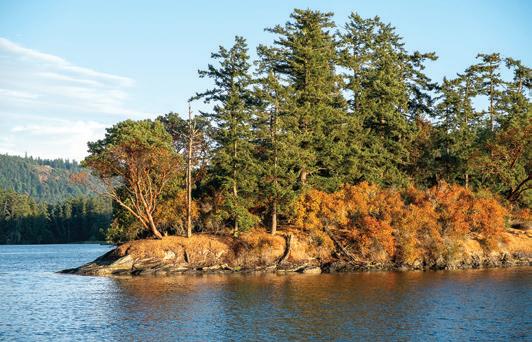
transom to check depth under the rudder, and breathed a sigh of relief. No problem. There was no catch, it was just that kind of amazing trip.
It was the second-to-last morning of the rally, which 48° North runs annually in conjunction with Ullman Sails. I don’t think anyone really wanted to wake up or move to a new anchorage, let alone think about the rally week coming to a close. It had been a jam-packed and too-short few days, each taken from a similar page of fun, fellowship, and unbelievably beautiful surroundings. The best stories never come from the perfect trips, but perhaps that’s partly because sharing the story of a trip this good feels a bit like boasting, like rubbing it in. If that’s the case, I guess you’ll have to forgive my humble-brag.
The rally fulfills different purposes for each individual who joins, but at its core is the principle that cruising with a group provides comfort and confidence to those with less experience, an opportunity to meet other 48° North readers and fellow PNW cruisers, and to have a boatload of fun along the way. It’s not an expressly educational event, but the amount of learning and information exchange that takes place in just a few days is truly awesome. This year was no exception.
Our group of nine boats rendezvoused at Cap Sante Marina in Anacortes on July 23. A meet-and-greet ensued over happy hour, and we got to know each other while we evaluated the itinerary, especially for the first day and night. A cooling system with rain was approaching. Our original plan had been to stay at ever-popular Sucia Island, which offers great protection from most wind directions, except the southeast. The weather models
didn’t agree, but at least a few suggested that the breeze would come in, maybe heavily, from… the southeast. This is why you write cruising plans in pencil instead of pen.
In these islands, though, options abound and we were ready with Plan B. Instead of Sucia, we’d head through the islands and stay in Garrison or Westcott Bay near Roche Harbor on San Juan Island. Not having a solid read on the cruising crowds with whom we’d share our anchorage, that choice of adjacent bays provides enormous anchorable areas with great protection for our nine boat group. We had visited on a previous rally and landed in Westcott after finding Garrison too crammed with anchored boats to even consider.
In 2023, this was not the case. After a stress-free passage through the San Juans, our group slowly entered the bay, with many of us asking, “Where is everybody?” The Rally HQ boat — the aforementioned CS 40, Blackbird — led the way and tucked into the shallow waters just in front of Guss Island with English Camp to the east. Whoa. I’d only been this close to these waters from the shore of English Camp.

Soon, all of the rally boats had dropped hooks nearby, each with ample room to swing, in the southeasterly portion of Garrison. Set for the night, we braced for weather that never materialized quite as rowdy as forecast. Many rally goers ventured to shore to explore English Camp or head over to Westcott Bay Shellfish Co, while others dropped crab pots with impressive returns. Soon the downpour arrived, and folks ducked below on their boats for a weather-inspired early dinner. Eventually, the rain dwindled and the sun made an appearance
for a golden few minutes before setting. It was a blissful first sleep at anchor. The next day, we’d venture into Canada.
After a quiet night and relaxed morning, we made our way through dreamy Mosquito Pass under gray skies. Soon, we were pleased to see a light southerly fill with enough pressure to inspire raising sails as we headed toward Turn Point. I was reminded of my numerous Round the County Race transits of these waters, as commercial traffic from each direction momentarily split the rally fleet; but soon we were reunited and enjoying building breeze as we continued into Boundary Pass in the direction of the Canadian Customs station located in South Pender Island’s Bedwell Harbor.
Anytime you clear into a new country, especially as the leader of a group, there’s no small amount of trepidation. Did someone forget their passport? Might a participant have a crime they didn’t realize would prevent them from crossing? Have they brought too many beers, eggs, or apples to be allowed in? My stress-ometer wasn’t really in the red, but there was solace nonetheless as the entire group cleared without mishap.
While it is always difficult for me to pass up a night at Bedwell’s Medicine Beach, a perennial rally favorite (in the right conditions), we had set our sights on an anchorage we haven’t visited since the inaugural 48° North Cruising Rally back in 2018 — Saturna Island’s Winter Cove. As an added bonus, we enjoyed the best sailing of the trip, as the southerly built to the low teens when we turned to port around Blunden Islet and into Plumper Sound. Blackbird was broad reaching at 8 and 9 knots with the main and a Code Zero. It’s always nice to share the rally leadership and our borrowed boat with a pro sailor and sailmaker!
It felt like we didn’t have enough runway to fully delight in the downwind conditions before the miles ticked away and it was time to strike sails and head into our anchorage for the evening. Luckily, another pleasant surprise awaited us.
For the uninitiated, the entrance to Winter Cove requires some attentive navigation, and cruisers must go well north to avoid reefs before turning back south into the peaceful, rustic bay. Accordingly, even the keenest watch keepers might not pay much attention to Winter Cove itself on the approach. Whether folks noticed from a distance or not, Winter Cove had almost no boats in it. When we visited before, we shared the bay with easily 40 other boats, and still had plenty of room. So, it was

with genuine awe that we entered the bay to find only four boats already anchored.
Winter Cove is bordered to the south and east by a BC Provincial Marine Park. Around the shore, there isn’t a great deal of development. Even after another boat or two arrived for the night, considering the forested surroundings and the astoundingly small number of non-rally cruisers, it really felt like we had this sought-after anchorage to ourselves. Given past experience with swirly currents, we advised against an overnight raft-up; but several rally boats rafted to one another for some refreshing sundowners after a fairly long travel day.
Once the raft-up parties broke up in the late daylight hours, some crews went to shore to explore the park or hunt for blackberries, while I ventured out in Blackbird’s dinghy with my camera to try for some glamor shots of rally goers and their boats. I thought, surely, this will be remembered as the best night of the trip (and possibly our respective summers), little did I know the “best” nights were only getting started. The sunset rolled on and on, deepening to rich oranges and purples as the luminous half-moon hung in the southwestern sky. The night was quiet as can be — so quiet you could hear the rushing waters of Boat Pass from the cockpit from a quarter-mile across the bay. I love Winter Cove.
On the following day, we enjoyed our first bright, sunny morning of the trip. Since we had a short travel day, we invited everyone ashore for coffee hour, along with a little business and a little more fun. Each day of the rally, we begin with a briefing covering the day’s navigation, weather predictions, and eventual destination. Often communicated over VHF, text message, or both, it was nice to discuss the day’s plans in person while standing around a chart. Our destination was Annette Inlet on Prevost Island — a location none of us had ever visited. Thus, our discussions leaned more on cruising guides and navigational resources than personal experience.
Before setting off, our group pursued a variety of shoreside activities. The crew from the Catalina 36, Castlewellan, had folding bikes and were already cruising around Saturna. Others strolled out to check out the park’s resident tidal rapids at Boat Pass. Those remaining got to enjoy a rally tradition — lawn games overlooking our anchored armada. Repeat rally attendee, Ed aboard his Tartan 3400 Rugosa, had brought a ladder ball set along; and I had my favorite lawn game, Kubb, as I typically do. After several hours of exploration and serious lawn game
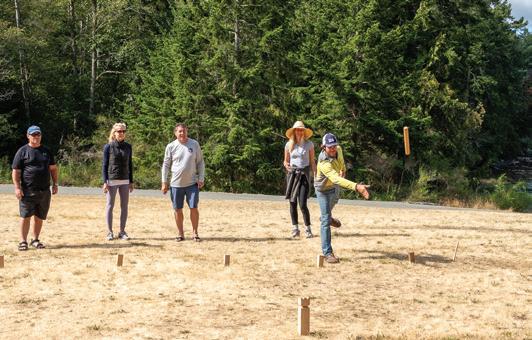
amusement ashore, it was time to weigh anchor and make our 10-mile transit.
After exiting Winter Cove, we noted several whale watching boats southwest of the channel. Proceeding slowly across Plumper Sound, we were giddy with anticipation… could it be? Yes! “Orcas!”

We sailed slowly under main alone, enjoying the intermittent show of at least four of these extraordinary animals. They swam east along Saturna’s Elliot Bluff and Payne Point, essentially greeting several rally boats as they began the day’s travel. The whole experience was gleefully PNW!
It’s tough to tear oneself away from an orca show, but soon we pointed north and enjoyed a bit of upwind sailing until the breeze evaporated in Trincomali Channel and we motor-sailed around Pile Point, the northernmost point of Prevost Island.
Passing several other enticing anchorages, we approached Annette Inlet slowly. It is a nerve-racking entrance, with a centrally located unmarked rock at the mouth. The mile-long bay is only a few hundred feet wide at its widest point. In the northern section of the inlet, boats were swinging at anchor, staggered to fit in tight spots. Passing by required weaving between these vessels in close proximity — we even disturbed a nude sunbather aboard one. Oops!
Continuing deeper into the inlet, we rounded a corner and began assessing options for a stern-tie raft up. We like to do this at least once per rally, because it invites cruisers with a range of experience and skills to try backing into a raft-up and/or practicing their stern-tie anchoring technique. It’s never quite
Lawngames are a rally tradition, and the author likes the game Kubb best of all.
as dead-easy as we envision yet, like always, after a little effort it worked like a charm. In the end, four boats joined the raftup, another decided to anchor stern-tied nearby on their own, while others chose to swing. There was plenty of room in this southern portion of the inlet, which we had all to ourselves.
With no option to go ashore, the raft-up provided a nice potluck and merrymaking platform, and everyone dinghied over to join the fun. Food, drink, and camaraderie were generously exchanged. It’s always fun to see how rapidly actual friendships are forged between folks sharing an adventure.
We had another stress-free night before the glass-calm morning I described previously. This was pinch-me cruising stuff of the highest order. Reluctant to leave our idyllic surroundings, we did eventually move on, knowing that we needed to get back to the San Juans if we were to have manageable mileage on the last day back to Anacortes. We left Annette Inlet with the assurance that we would certainly return, and soon.
The day’s big adventure arose as we learned that just a few weeks prior to our journey, the US Customs entry point at Roche Harbor — where we had planned to clear customs — had ceased being a “manned” entry location. Kudos to Anita and Andy of the Olson 34, Watermark, who had that on their radar and alerted the group. See, even rally leaders benefit from cruising with friends!
Not knowing exactly what this change in Roche Harbor meant for our group, we rerouted to Friday Harbor just in case we were called to the dock. Meanwhile, we all tried to get ducks in a row to enter using the CBP Roam mobile app. In the end, the process couldn’t have been smoother, and all of our rally boats cleared back into the states using the app without stopping ashore.
The stop for our final evening was Parks Bay on Shaw Island. A pleasant and quiet bay, known for great sunsets, Parks is nearly always a good choice — and definitely was on this rally. The bittersweet conclusion of our trip was inescapable. One boat had already parted ways to continue cruising farther north in the Gulf Islands, while another had cruised farther south than Parks Bay to position themselves for a long southbound delivery the following day.
Nonetheless, the rally fun continued! The sweet and generous pair, Dwight and Christa, sailing their lovely Jeanneau 410, Frolic, invited the entire rally crew to join them and their two canine companions for taco night on their spacious cruiser. It

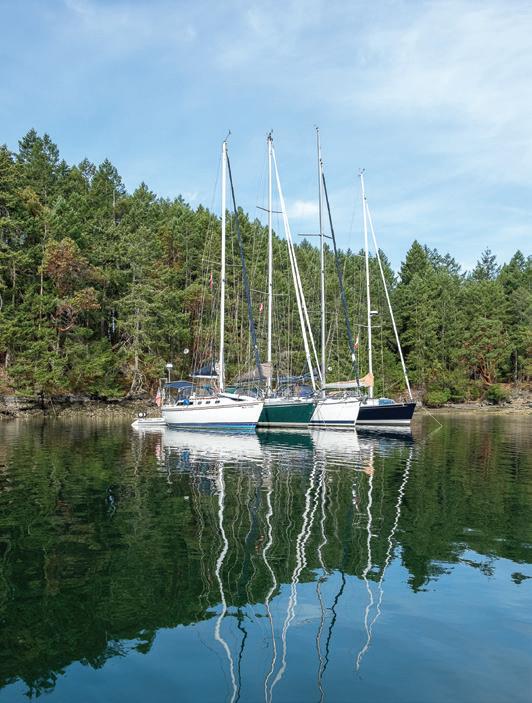
was the ultimate rally wrap-up — a circle of new friends sharing a meal, reminiscing about our fabulous week together, trading stories of land-life, and of course endlessly discussing boats and cruising.
Eventually, the fleet of dinghies tied to Frolic’s transom shrank as everyone proceeded back to their vessels for the evening. For me, the quote of the week came from a first-time rally participant, Mary, who is a member of the crew on All’ Swell, a Hunter 376. She and her husband had a history of cruising a small boat with their young family many years back. They’ve recently returned to boat ownership, excited to share the cruising life with their grown kids and young grandchildren. As Mary stepped from Frolic’s swim platform into her dinghy, she said grinning, “This was great, I’m not afraid anymore!”
As the sun dipped below the western horizon and set on our rally journey for 2023, it was impossible not to feel grateful and gratified. It had been a splendid week, in extraordinary places that we had mostly to ourselves, with fellow cruisers whose kindness and generosity and spirit of fun knows no bounds. Newer cruisers acquired extra confidence, everyone deepened their appreciation for these precious waters, and we all gained some new cruising pals. This is exactly why we do the 48° North Cruising Rally.
Joe Cline is the Managing Editor of 48° North. Join us for the 48° North Cruising Rally next year, July 28 - August 2, 2024. Registration will open January 12, 2024, and will be limited to 15 boats.
I’m happy to report that this year’s Women At The Helm 1 “Going the Distance” regatta hosted by Sloop Tavern Yacht Club was quite well attended, and mother nature provided some champagne sailing conditions. The event has quickly become popular as one of the region’s races that stipulate a woman must drive the boat.
The forecast called for predictably unpredictable Pacific Northwest summer conditions, with a convergence zone between Edmonds and West Point. An unseasonably gray and chilly morning gave us wind that we weren’t expecting, a 7-knot southerly.
Valkyrie, the locally-built cedar and carbon Synergy 1000 we were sailing, is not new to Puget Sound, but has been in early retirement for the past five years. She’s a powerful 30-foot boat at 3,800
pounds with a square-top headboard measuring four-and-a-half feet.
Right out of the gate, our class was competitive. The pin was favored and we were lined up on starboard, just above the last boat to make the pin — the Farr 30 Nefarious skippered by legendary Regan Edwards. Rush, a Sunfast 3600 skippered by Paula Bersie, had to come back around and split on port tack, heading away from the breakwater.
The first mark was located southwest of the Ship Canal entrance, and was a challenge to reach with the lack of wind. West Point was next, followed by Spring Beach, back to the start, then West Point, Meadow Point, and on to the finish.
A massive ebb was predicted until 3 p.m., making it tough to get around West Point. If you stuck your nose out too far, the current would push you sideways in the light wind. We made it around and settled in for a beautiful downwind run, when the wind switched around to a northerly. We transitioned smoothly to the jib and, within a minute or two, we were sailing upwind again to the elusive Spring Beach mark.
We stuck to the outside on our way north to take advantage of the 2-knot current. Nefarious and the 1D35, Shrek, were leading our class by a significant margin at this point. Scheme, a Pyramid 30 owned and skippered by Taylor Joosten, was also on my radar. Taylor and I regularly sail together and she’s a
phenomenal sailor, but I know her tricks. This leg was essentially a drag race now that the wind had switched.
On a good day, the off-white staff at Spring Beach is hard to find. We got out the binoculars, but even that didn’t help us find the mark. We sailed a little too far north before bearing away to the mark, giving Nefarious a bigger lead. Unfortunately for Shrek, they sailed far past the layline and only realized as we were approaching the mark, requiring them to pop their kite to get back down the course.
We set the spinnaker on port jibe with the intention of almost immediately jibing out. Under our pretty new kite once again, we carefully tried to link the patches of breeze together and stay out of the ebb. Rounding West Point again, we wound our way back north for Meadow Point. The current was still flowing steadily, so we took advantage of it instead of taking the traditional route back into the breakwater.
We rounded the final mark to starboard, set the kite in a steady 7-9 knots, and headed for the finish line, protecting our position by staying in the middle of the course.
We were pleased to be second to finish, correcting out second in class and fourth overall, all while being rewarded with a pristine day of sailing. Valkyrie was very happy to stretch her legs again and be back racing on Puget Sound, too.




What can I say about the Whidbey Summer Classic Regatta except, “Dang, that was some Penn Cove perfection and a whole lotta Oak Harbor hospitality.” I think I had forgotten what it was like to sail in that pretty bay. There was a great afternoon breeze each day, with smooth water and plenty of sunshine. It’s quite a unique space with very little boat traffic and the sweet waterfront town of Coupeville tucked along the shore.
Oak Harbor Yacht Club (OHYC) really rolled out the red carpet with free moorage and dock camping, which ran from July 2830. Each morning, OHYC provided continental breakfast, and in the evenings there was a delicious complimentary dinner and entertainment.
To be honest, I didn’t have crew available on Friday for the first day of racing so I spent that afternoon bringing my Santa Cruz 27, Wild Rumpus, to Oak Harbor. It is my understanding that it was the best breeze of the weekend that day (just my luck to deliver the boat upwind in it!) and they got off three races. Spirits were high when I arrived for the barbeque chicken dinner and DJ dance party on Friday night. So many creative sailors thought of so many clever sailing-related yacht rock classics to request and we danced the night away. Among the things that really stood out were the kids! Not only ruling the dance floor, but they had also been out on the race course that day and were bragging about their racing exploits. Even the little ones! Super cool.
On Saturday, the breeze initially filled in as a southerly, and there was discussion about a Saratoga Passage race. However, by the time the racers arrived on the course it was the prevailing Penn Cove westerly. There was a lot of current pushing you into the bay and, on Rumpus, we overstood hard on the first beat. We made the same error on the second beat, but on our third try, we really paid attention. Mostly we paid attention to when and where the fast locals tacked, which was well short of the layline. We just shrugged and decided that it didn’t hurt to put in a couple
by Stephanie Campbellextra tacks if we missed it. Elevator going up. Ding! Made it. It turned out to be another three-race day, with winds in the 8-12 knot range. Most of the time, we were at the top end of using the big genoa rather than the small jib. Free arm-day workouts at Planet Rumpus!
Saturday night featured delicious barbeque ribs for dinner and more action on the dance floor, this time with live music by Soul Siren. One sailor mentioned that he felt like he was at a wedding, which nailed it perfectly. It was an all-ages dance party! After the last encore was played, many sailors kept the party going and went to town for karaoke at the Tipsy Jellyfish, one of the regatta sponsors. There were reports that the extra fun people took the party back to the camping area at the dock and there was some late night hot tubbing. A-plus for effort, fun people of the Whidbey Summer Classic Regatta. On Sunday morning, crews arrived a bit later than the days before. The wind was light and oscillating from southerly to easterly. We drifted around with some inevitable shenanigans. Stereos played, some sailors went for a swim, cookies and drinks were passed around. Slowly, we started drifting with purpose towards the Coupeville dock where many boats tied up and sent crew for ice cream reconnaissance on Main Street.
After lunch the westerly started to roll in and we got in one good race with a solid 10 knots or more by the time the marks were set. Each day, we had a nice kite run back to Oak Harbor after racing. It was a great chance for crew to try driving or trimming the kite if that’s not what they normally do on board.
On Sunday evening at the Oak Harbor Yacht Club, we had awards and the most pizza I think I have ever seen in one place. All that was left was the sunset sail home with a nearly full moon through the Swinomish Channel. A great time was had by all!

Alyosha kicks it off: This was going to be the toughest regatta yet for Jonathan and I on our shared Jeanneau Sun Fast 3300, Red Ruby. We would be competing against 56 other talented, well-prepared boats in a two-race series, and the first course was simple: start in La Trinite and finish in front of the Royal Ocean Racing Club (RORC) on the Isle of Wight some 4055 hours later. However, negotiating up and around the Breton coastline means sailing past some of the most infamous places in the Atlantic. Photographs of “Raz de Sein” and “Chenal du Four” give you the idea of how tricky — and potentially dangerous — this part of the world can be! We were excited but also a little nervous.
For our race, the weather looked relatively benign. The forecast was for a moderate beat up to 15 knots around Brest, followed by a quick spinnaker run across the English Channel, with the only major decision there being which side of a TSS exclusion zone to go around.
We had a good start and managed to be one of the first seven or so boats past the La Teignouse Lighthouse, which guards the entrance of the Bay of Quiberon. Out on the ocean, the wind had subsided to about 10 knots so we immediately peeled to the J1 and continued our way out to the northeast on port tack towards the Isle de Groix and Lorient. Here, the wind began to lighten considerably and we ended up taking a tack back out towards the west and separating from our main group towards the right. Although we
byended up consolidating a pretty big loss on the boats who were farther to the left, we gained on the rest of the fleet and, as we sailed past the western side of Groix, we were among the top eight boats in our fleet.
As the night wore on, the breeze began to destabilize and a few drops of rain showed that the forecasted weak front was about to be upon us. The next 6 hours essentially decided the race as the fleet sailed up towards the peninsula of Penmarche. As the wind totally died, you had to make a choice. Position yourself farther to the right to benefit from less adverse tide and potentially some early morning drainage breeze off the land, or, you could make a move to the west,
beyond the peninsula and hope to get back into the remnants of the gradient northwesterly. On Red Ruby, we had the unfortunate experience of picking neither and staying in the middle. This turned out to be incredibly costly as we quickly sailed out of the top 10 and back into the 40s. Once the breeze filled back in around noon and we made it around Penmarche, we were over 10 miles behind our class leaders.
Our focus was now very simple. We were in a bad spot, however, our position would become exponentially worse if we didn’t manage to make the tide gates at the Raz De Sein and Chenal du Four. We doubled down and worked as hard as we could for the next several hours and

managed to squeak around the Chenal du Four as the tide barely started to turn. Finally, we managed to get freed up enough to set our spinnaker, and we set the A2 in a 10-14 knot westerly and began to sail fast towards the UK coast — expecting a left shift.

What followed was 12-14 hours of extremely steady running conditions in about 12 knots of wind. We eventually found a decent mode, although boats with big symmetrical kites were proving to be tough to keep up with in the dead running conditions (we have A sails and no pole). We did our best to stay in the game and wait for another opportunity. And boy did an opportunity come.

On the afternoon of the third day, a distinctive cloud line began to be visible to the north. Looking at the AIS tracker data, we quickly realized this was going to bring a pretty extreme right shift, so we worked hard to position ourselves farther to the south than the rest of the fleet. This paid off well as we managed to pull back 4-5 miles on the boats around us and keep Red Ruby moving fast in the variable and shifty cloud-induced wind.
The clouds following the front seemed to stall out over the fleet for a while and we spent the next 4 hours running in less than 8 knots and in extreme rain. It was wet! Fortunately, we were able to keep the boat moving well and continued to gain on the boats around us. By this point we were nearly in the top 20, which felt amazing considering how far behind we were 36 hours earlier.
The weather gods were not done yet! As we approached the Needles, we knew the wind was expected to shift to the right even more, so we continued to protect the south side of the course. Our positioning again paid dividends as we were now even with the lead SF3300 (a French team). Then, as we were peeling from the 1.5 to the Code Zero, the wind suddenly piped up to 25 knots and we ended up performing a bit of a horror show of a drop, shrimping the kite and running it over.
It took all we could to furl the Code Zero and eventually pull the shredded 1.5 out of the water. Once past the dangers of the Shingles Channel, we realized there were quite a few boats immediately near
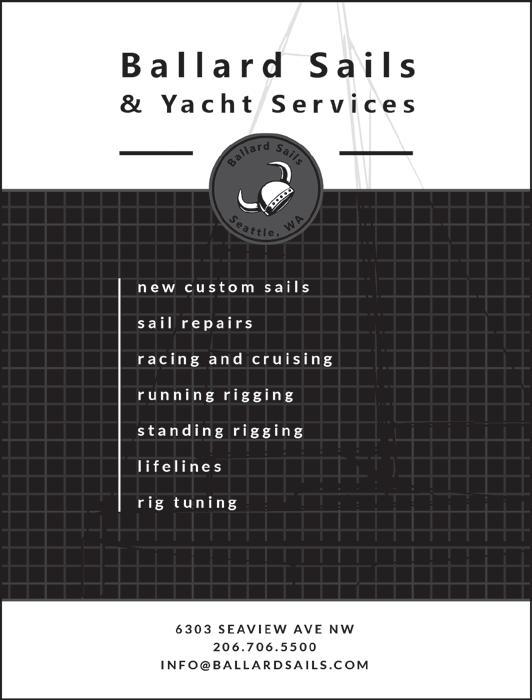
us, including Diablo, who only owed us about 3 minutes. We quickly re-set the A4 and blasted down the Solent to the finish line, catching Diablo by just a few seconds.
Exhausted and soaking wet, Jonathan and I managed to get the boat put away in some semblance of respectability before staggering off to the RORC where a real bed awaited us.
In the end we were 15th overall, 2nd SF3300, and 2nd non-French boat, in the first of the two-race series. This meant that although we were likely out of contention for the podium, we still had plenty of opportunity to move up after the Cowes-Dinard race.

Jonathan continues the tale: As we heard from Alyosha, the race from France to Cowes was pretty full on, and we appreciated having two full days to recover and prepare for the second race heading back to St. Malo in northern Brittany. These races take a lot out of you, and it is critical to let your mind and body recover from the turmoil you put them through. So we were pretty chill, doing some small boat work projects,

socializing with our competitors, starting to look at the weather for the next leg, and trying to rest as much as possible. Cowes is a great sailing town, one of the iconic racing destinations in the world. Half the shops on High Street are sailing related, and there is so much nautical history all around. Think Newport, Rhode Island on a smaller scale… and with British accents.
As race day arrived, we were feeling calm and prepared. The course consisted of three parts: First, a lightish reach/run out of the Solent and past the Needles. Then a 70-mile reach in medium air across “La Manche” or the English Channel. And finally another 65 miles of tricky upwind through the current infested waters of the Channel Islands and into St. Malo. As an aside, St. Malo has the largest tidal range of any seaport in the world, 12 meters, which translates to 40 feet! Needless to say, this produces some navigational challenges and tons of current. We think we have a lot of current on Puget Sound, but this is next level, or maybe the next level after that.
As soon as we left the dock for the start, we realized something was wrong with our battery charging system. The alternator was not putting any amps into the battery. We picked up a mooring and tried to diagnose the situation, but alas without success. So we went into
extreme energy conservation mode, using the instruments only when strictly necessary, and not using the computer for routing or tracking competition, hoping we could milk our charge until the finish. Basically, we monitored the VHF and switched on the instruments occasionally. Although this proved to be a performance issue later in the race, at the time it was strangely liberating.
We got a fairly conservative start with 60 boats on the line and 3 knots of current trying to sweep us over. We worked hard in the puffy wind near the Isle of Wight and were among the leaders exiting the west end of the Solent. There was a period of light air, then the predicted easterly gradient filled in to take us across the Channel. With the Code Zero and staysail, we made good time reaching in 15 knots of wind. As the sun went down, the current changed, which made the angle broader and we peeled to the spinnaker. As we approached the south side of the Channel at Casquets, the current started to really rip, nearly 5 knots against us. The breeze also started getting unstable. We went back to the Code Zero for a while, then got headed and put up the jib.
Now it was getting really tricky… also really dark. There were millions of lights around from the 215 other competitors. The current was smoking against us but
was starting to change. The wind went way right, and we tacked onto starboard. In retrospect, we should have tacked sooner, as there was more favorable current to the east, which we didn’t really internalize as well as we could have. We started seeing boats that were well behind us, so we knew we had made a loss, but it was still dark and the beat up the north side of Guernsey to the Les Hanois light was demanding our full attention. Eventually, we got back on our feet and as the sun rose there were still boats everywhere, and all to play for. We expected the wind to go right, so we positioned ourselves to the west of most of the fleet. But during that morning the breeze died and went left, so we were not in a great spot with 25 miles to go.
Alas, we kept fighting, since there was really no other option. As the wind completely died, we started playing for a sea breeze. An hour later we were rewarded not by a thermal, but by a huge storm cloud that developed just west of us. Soon we were flying downwind in 20 knots, heading right for the finish. After a few jibes the wind stabilized and we had a nice run into St. Malo. The cloud had saved us from complete humiliation, but we are still scratching our heads about how to do better next time we encounter those conditions.

In the end we got 8th in IRC Double of 64 starters, and 25th overall IRC of 179. Combined with the La Trinite to Cowes result, this gave us 9th overall for the IRC Doublehanded Europeans. One British boat beat us, and the rest were French (mostly JPK 1010s). Many of the French teams have been training together this winter and spring, and it really showed. They have consistently good speed, they keep the weed off their foils, and they are really good at playing the current as it interacts with islands and headlands. So, we have some work to get to that level. But now we know where the bar is.
We’re back home now, but it’s hard to shake the memories of our incredible trip to France and England. We sailed well, tried as hard as we know how, and made progress in a number of areas. But we have yet to put together a complete longer race that shows our potential. So we will be back with that as our goal for our next event in September in Spain.
Sunshine, blue skies, fluky winds, and a flood current set the stage for the 53rd annual Shaw Island Classic yacht race hosted by the San Juan Island Yacht Club (SJIYC) on August 12.
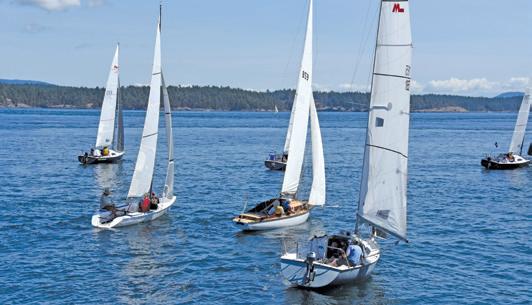


This race is unique in that Shaw Island is the only mark and can be rounded in either direction. It is only a 13-mile course, but variable winds and currents, narrow rocky channels, and ferry traffic often turn it into a nautical chess game.
Most of the fleet of 33 boats took a counterclockwise course, betting there was enough wind at the start to overcome the flood current in San Juan Channel. Theoretically, this course would allow riding the flood through the notoriously windless Wasp Passage. This bet paid off with nearly all counterclockwise boats finishing the race.
With boats ranging from a Formula 18 catamaran to a Concordia 50 monohull, the racing advantage can shift quickly. “This year’s race was especially taxing, battling it out with the King 40 Hydra in light winds, conditions that do not favor us,” said Ben Colwell, skipper of the Formula 18 Rum Line and firstplace finisher in the multihull division, Rum Line also won line honors.
“We eventually caught Rum Line,” said Sam Richardson, skipper of Hydra and third-place finisher in the PHRF-A division, “but it didn’t last as they sailed impressively through the last third of the race with good speed and tactics.”
The Shaw Island racers know their competition, since most have entered this race for many years and, in some cases, over multiple generations. “I thought it was the coolest thing to see my dad’s name [Bryan Colwell] on the multihull trophy,” said
by Peg GerlockBen Colwell, “I remember thinking to myself, as a kid, someday my name will be on that trophy.” He was right. Ben Colwell has placed first in the multihull division 11 times since 2006.
Richardson added, “It was a great honor to lose to the team who introduced me to this fine event 23 years ago, Gil Lund and family on the same boat, Interface,” a Dash 34 skippered by Mark Bunker and first-place finisher in the PHRF-A division.
A shout out goes to RIFF, a J/70 with the doublehanded team of Boris Luchterhand and tactician Ryan Forbes for placing first in PHRF-B division, who were also first overall on corrected time. “Ryan made the bold decision to hoist a kite at the start that got us away quickly,” said Luchterhand. “We love this race and had fun every moment just like every year!”
Spirits were high, and spirits were enjoyed, as racers gathered at the lovely SJIYC clubhouse overlooking the harbor for postrace banter and a hearty lasagna dinner.
The Perseverance Award, in honor of Wally Lum, who skippered Marquita in the first Shaw and has competed in every race since, goes to the last boat to cross the finish before the deadline. This year’s winner was Juans2B, a San Juan 21 skippered by Paul Von Stubbe, one of only two clockwise boats to finish the race. “Crossing the San Juan Channel to the finish line, we were battling currents and the clock and knew the 6:00 p.m. cut off was not far off. Luckily, we finished with time to spare. Now all we needed was a bottle of champagne to celebrate, little did we know that was the prize for being last to finish!”
Complete results and more photos can be found at sjiyc.com/shaw
The infamous Double Damned brings sailors to the notoriously windy Columbia River Gorge for what’s supposed to be a 40-mile downwind rip full of planing, wipeouts, and as much fun as you can have on a sailboat. The forecast for this year’s Double Damned was uncharacteristically light. Wmoore delivered our J/70 Spitfire up from Hood River — which lies at the halfway point of the race course between Cascade Locks and The Dalles — the day before the race in 20-knot winds that had been forecast as 1015, so we were hopeful that the next day would outperform predictions as well.
A fleet of sixteen boats, mainly J/70s, Moore 24s, and Wylie Wabbits, prepared for a 10 a.m. start. Unfortunately, 10 a.m. arrived with dead calm conditions. We remained under postponement until we had a breath of breeze fill in across the river just after 11:00, and the race committee called for a warning at 11:30.

Aboard Spitfire, we found ourselves slightly behind at the downwind start in only about 5 knots of breeze, forcing us to navigate through the group of Moore 24s sailing different angles with their symmetrical spinnakers. After more than a dozen jibes in the first 30 minutes of the race, we got a bit of separation and were clear to sail more freely.
Then, In the span of a few minutes, the wind shut down and the river turned to glass. Two J/70s, Matt Laffitte’s Lift Ticket and Andy Mack’s Awkward Turtle, managed to stay in the last of the breeze and build a substantial lead before they lost their wind as well. Marcos McGee’s Wabbit FAFO managed to ghost along the shore with a full kite in what appeared to be no breeze at all before finally losing their magic puff.
The calm lasted for 90 minutes. FAFO was the first to call in their retirement over the radio. Once one boat decided to call it, others were sure to follow. We set a 3 p.m. time limit — if there wasn’t wind by then, we were going to dig out the motor and head in, too.
At 2:42, and at least 500 yards back from where we’d lost our wind, we saw the boats at the back of the fleet putting their kites up and bringing wind toward us. We prepared to get back on track, and a minute later we were cruising along at 3.5 knots. At this point, we were over three hours and only 5 miles into a 40-mile race with an 8 p.m. time limit to finish. There was still the option to shorten the course to the halfway point in Hood River. Weather stations ashore were showing wind in the
teens at Viento State Park 8 miles ahead, so we knew there was wind up there somewhere. The wind pushed the back of the fleet up to the leaders, causing a restart for the remaining nine boats, but somehow Lift Ticket managed to find their way out ahead early, and maintained that half-mile lead they’d built and extended it as they would be the first boat to the bigger breeze at Viento. It was now a race for second place.
We slowly built a small lead over the Moores and, just west of Viento at around 4:30 p.m., we hit the promised wind — it was blowing 13-15 knots with gusts near 20! The race quickly changed pace and we were up on plane hitting boat speeds of 11 and 12 knots. As the second boat into the new breeze, we immediately began to extend our lead, but the remaining Wabbit was flying in these conditions, and we had close crosses with them several times.
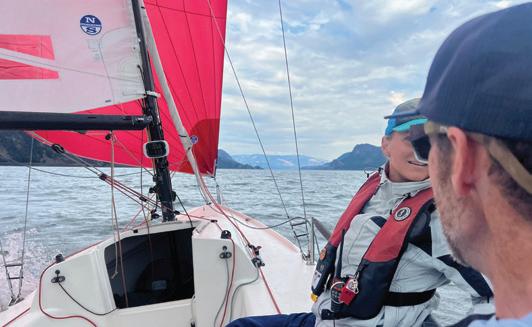
As we approached Hood River and the breeze eased back to 10 knots, the Wabbit shot down the north edge of the river and we hugged the south side, trying to avoid the current. We crossed under the Hood River Bridge, the shortened finish line, a couple boat lengths behind them and a few minutes ahead of the competitive Moore fleet.
On corrected time using NorCal downwind PHRF numbers, first place went to Matt Laffitte’s J/70 Lift Ticket, nearly 20 minutes ahead of us in second place on Spitfire. We managed to beat out Michael Lazzaro’s Moore 24 Covfefe, who came in third, by a minute and a half.
Results: www.regattanetwork.com/event/25381#_newsroom
The author’s J/70, Spitfire, charges downwind once the breeze filled in.
$69,000
Built 1986 by the Sam Morse Co. Volvo D1-30 28hp low hours. Diesel bulkhead heater, Monitor windvane, 3 burner Force 10 propane stove with oven and broiler. Jib, staysail, mainsail, drifter, storm jib, storm trysail. Located Sitka, AK. Details at bristolchannelcutterforsale.com
» Contact John Herchenrider • (907) 752-5033
• johnherch@gmail.com • $69,000
$45,000
GEORGE BUEHLER'S DRAGONFLY 50 (UNFINISHED)
Hull planked, caulked, painted. Deck and cabin on. Prop shaft in. Includes suit of sails, mast, engine. Not sure of engine condition. Pictures on request. Located on Whidbey Island, WA.
» Contact Gail Buehler • gailsspa@yahoo.com
• $20,000
GREAT SKIFF FOR SALE
10' Davidson MFG Ltd fiberglass skiff (ID #1103333Vancouver BC) with trailer. Needs minor cosmetic work. Drain hole, good skeg, oars and oarlocks included. Purchased 2 years ago. Great shape.
» Contact Ross Mayberry • (206) 735-9592
• rossmayberry13@gmail.com • $1,500
33' TARTAN TEN SAILBOAT FOR SALE
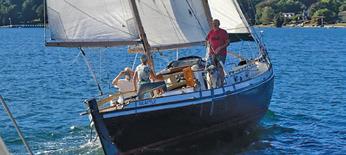

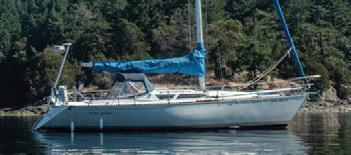

Health and old age forces sale of 33' Tartan
Ten sailboat. Excellent entry boat for club racing. Well maintained and race ready.
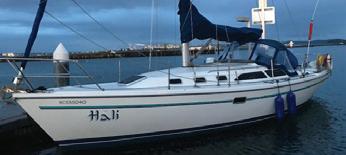
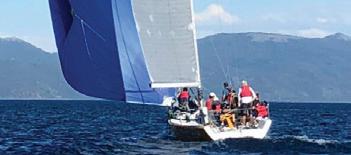
» Contact Arnold Jarlock • (360) 377-0285
• arniejarlock@aol.com • $8,000 OBO
1978 PACIFIC SEACRAFT 25

Newly restored, 2 cylinder Yanmar (new), new tankage, Furuno radar, good sails, trailer, tiller master, 95% finished. Illness forces sale. » Contact Bernie Stoll • (541) 961-5314 • berniestoll@gmail.com • $22,500
$60,000
Excellent condition, located in Port Townsend. 35hp Westerbeke diesel engine, jib furler, Dutchman furling system, swim step.
» Contact Chris Wickham • chriswickham45@gmail.com • $60,000
$60,000
Auto pilot, watermaker, SSB and much more. Email for description and equipment list.
» Contact Ace Anderson • (503) 458-6195
• aceandy@centurylink.net • $60,000
$43,000
1987 C&C 38 MK 2
Clean, well maintained racer/cruiser. Tall rig, deep keel. Sleeps eight, but comfortably cruises four in two cabins. Inboard Yammer diesel (2370 hrs), three headsails, spinnaker, GPS, Radar, fire suppression system. Beautiful teak interior. Pleasant cruiser for Puget Sound, San Juans, and BC waters.

» Contact ethelsnakes@gmail.com • $43,000 OBO
Designed by William Atkin, built by Don Pitbaldo, launched in 1969. I am only the second owner! Replaced kerosene lights with LED’s and brought much else into the current century. Sails fantastically! Only selling because I’ve moved to NM! » For all the details you’d ever want to know contact Cat Gilliam
• (206) 228-6884 • catgilliam@gmail.com • $45,000
$129,000
Scintilla is an ocean cruising liveaboard used by every owner for that purpose. She has been equipped, maintained and updated for that purpose constantly. The current owners have sailed her 35k miles in the last ten years in comfort, safety and with good speed. She is equipped and ready for her new owners to continue that mission. For more info see bit.ly/CT49-Scintilla
» Contact CP Harry • (206) 503-9568 • sv.scintilla@gmail.com • $129,000
$79,000
A carbon fiber sport boat built for speed and was awarded as Sailing World's 2004 performance boat of the year. Features include a large open cockpit, 59’ foot tall keel-stepped carbon mast, light pole. The light weight and tall mast makes for one of the fastest race boats for its size. Formerly owned Farr 36’s Wicked , USA 5, and War Pony , USA 2. Google "Farr 36 Wicked Sister " for more information on performance, race results and photos.
» Contact Richard Courcier • (530) 320-1656
• rcc12345@aol.com • $79,000
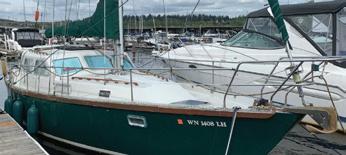
$14,000
1966 CENTURY RESORTER 17
Mahogany inboard. New varnish & bottom paint. Newish 383 (500hp). 50 mph. New upholstery. New cockpit sole. New fuel tank. New gauges. Rebuilt transom. New king Trailer. Ski tow-bar. Nearly new custom cover. 5200 bottom w/glass-epoxy over. Custom teak swim step. Serious inquiries only.
» Contact Jim Llewellyn • (206) 842-4552
• jim.llewellyn47@gmail.com • $14,000
$4,999
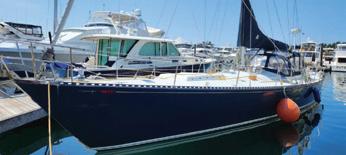
Very attractive. Jaunty and sassy looking. Constant admiration at the dock. Swing keel. Pop top giving massive headroom. Most capacious of most any boat of 2000# bare. Very good galvanized. roller trailer (one issue). Excellent cushions.


» Contact Richard Dodge • (206) 954-7208
• dodgerichard027@gmail.com • $4,999
$398,000
KOHINOOR
Custom C&C 61 was originally built for Herbert Von Karajon, the conductor of the Berlin orchestra. The original name of this yacht was “HELISARA” and was extensively raced in the Mediterranean. She was sold to a French admiralty lawyer who continued racing her in the Mediterranean. The current owner purchased this yacht in Jan 1984 and sailed her at that time across Atlantic. More into at: www.boatline. com/listings/1976-custom-built-61-ft-502615
» Contact Norris Y. Palmer III • (360) 298-2499
• palmerlistings@gmail.com • $398,000
$43,500
Extremely well built blue-water performance cruiser. People ask, “Is that a Swan?” Well-balanced rudder. Sleeps 6, V-berth, quarter berth, and convertible salon. 120 hrs on Volvo D1-30 engine & Saildrive. SIMRAD instruments. Garmin plotter & radar. 2022 nav charts. Sails are in great shape: Genoa and spinnaker. Force 10 stove. Webasto diesel heater. Many updates and replacements. Bellevue, WA
» Contact Charles Bockholt • (425) 890-3992
• charleybockholt@frontier.com
• $43,500
$75,000
CABO RICO
38
I reluctantly am selling my boat of 30 years. A fine boat for a couple to cruise. We have cruised her over 10,000 miles, and her previous owner sailed her to the South Pacific (Australia) and back. She has been well maintained over all that time. Easy, comfortable and safe boat to cruise, as well as built to the highest standards.
» Contact George Leonnig • 1(503) 707-6062 • moctobi@gmail.com • $75,000
$35,000
Comfortable cruiser and NW veteran. Dual helms. Yanmar 3GM30 engine with Autoprop. 2- 30 gal aluminum fuel tanks. Pressure hot and cold H20, propane oven, heater, engine heat, Newer 130% Genoa & Harken furling system. Main sail in good condition. Bruce anchor manual windlass. Bottom sider cockpit cushions. Radar & GPS. Moorage available.
» Contact Douglas W. Davidson • (425) 864-1955 • ddavidson@pumptechnw.com • $35,000
$115,000
World Capable Cruiser. Ready to take you cruising. Beautiful yacht. Cutter rigged with oversized rigging and extra cockpit winches. Lots of newer equipment; 40 hp Yanmar engine, autopilot, radar, stove/oven, watermaker. Cruise equipped; large sail inventory, windvane, heater, fridge/freezer. 2018, engine and power train refurbished at $20K cost. Orcas Island, WA.


» Contact Tom Owens • (360) 632-8896
• svlandsend@yahoo.com • $115,000
$47,500
1987 J/35
Extensively refurbished, re-wired, re-plumbed. Dry deck and hull. Nearly new Yamar 3YM30 with only 330 hours. Deluxe wood interior that’s in excellent condition. New diesel heater. All new upgraded running rigging. New tri-radial dacron main and jib. Mast Repainted with Awlgrip. Bottom barrier coated LED lighting throughout. In Bellingham WA.
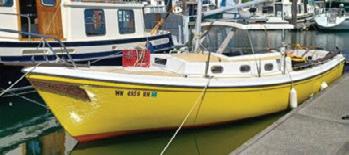
$25,000
Quality racer/cruiser. Well maintained, upgraded. Bottom foils faired/painted 2018. Diesel htr, hot water, refer/freezer. Furuno Navnet chart plotter GPS, AIS. Digital charts Vancouver Is. to Oregon. Radar, autopilot. Bimini covers. Perkins M30, full service 11/22, Flexifold 3 blade prop. Full set sails w/ cruising genaker. Lying Brownsville.



» Contact John Burton • (360) 731-2461
• Jcburtonclan@gmail.com • $25,000
$3,200
Own a classic traditional: Marie Anne, a Friendship Sloop. Originally gaff rigged fish boats in Maine. Mahogany planking, two-cylinder Yanmar, sails. Needs some work, the owner, deceased, was out of state for eleven years. The boat has been in saltwater storage, under cover. This is for someone who loves a historic type vessel and can fix her up.
» Contact Paul Kelton • (206) 851-0042
• pkeltop@gmail.com
$4,000
• $3,200 (Negotiable)
TENDER FOR SALE
10 foot dinghy. Epoxy encapsulated, Chesapeake Light Craft Dinghy Kit. » Contact Richard Groesbeck • (360) 739-1575 • dickgroesbeck@gmail.com •
$4,000 OBO
$10,000
DRASCOMBE LUGGER


Complete rebuild with new sails, New paint-English Racing Green. NEW: bottom paint and boot stripe; varnished spars-varnished rub rail; teak oarlock beds; oarlocks; oars; stainless steel main sheet horse; engine mount with stainless steel bolts and eyes; 4 stroke/4 horse Yamaha longshaft with 1 hour on engine
» Contact David Bolton • davidbolton11@yahoo.com
• $47,500
» Contact Contact Brenda (360) 927-9735 OR Steve (360) 739-8674 • Bhiggmo@aol.com
• $10,000
$2,400
No ocean too big, no trip too small, no ship too large, no mast too tall, sail or power, we move them all!!! When you are ready, give us a call. Professional service since 1967.
NUTSHELL PRAM
CappyTom@aol.com • (206) 390- 1596

$3,000
NEW
$8,000
11’6” AB INFLATABLE W/RIGID ALUMINUM BOTTOM & 25HP TOHATSU 2-STROKE OUTBOARD

Excellent condition! King galvanized trailer included. Features large 17” tubes, upgraded center console steering station, electric start, Linux coated interior bottom, davit hoist points, running lights, secondary Racor Fuel Filter, new battery & new 9 gal fuel tank. Titles available for both boat & trailer. » Contact Reilley • (253) 514-1101 • sheilaretires@yahoo.com • $8,000

Cliff
(360) 207-5016 • (206) 718-5582
509.928.1964
Asymetrical drifters & spinnakers
Classic Sails (Gaff, Sprit &


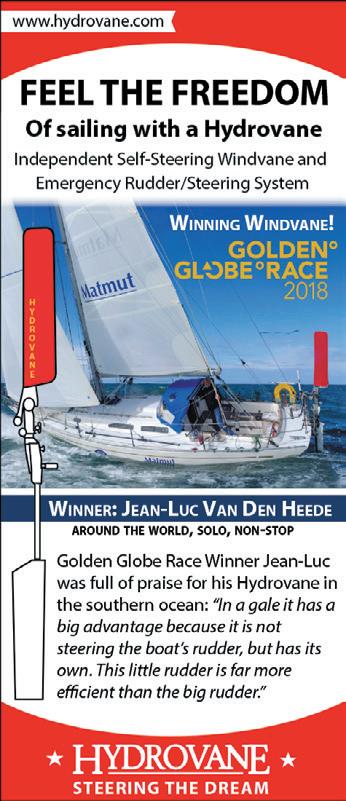
MOORAGE
LIBERTY BAY MARINA
40’ – 48’ – 60’ slips. Great location in Poulsbo, WA Restrooms, Showers. Call the Marina Manager for availability and waitlist options: 360-779-7762
ORCAS ISLAND DEER HARBOR MARINA

Winter Monthly Moorage Available

October 1 - April 30 $10.00/foot
20’ to 100’ slips available.
May 1 - June 30
$15.00/foot
20’ to 55’ slips available.
No liveaboards and vessels must have insurance
Please email mbroman@deerharbormarina.com
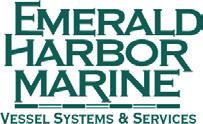
Based at Elliott Bay Marina
Please contact us to arrange a visit: 206-285-3632

E-mail: info@emharbor.com
Electronics E-mail: larry@emharbor.com

Fractional Membership makes boating affordable & easy! Your boat is ready when you are!
https://sailtime.com/location/anacortes info@seattleyachts.com
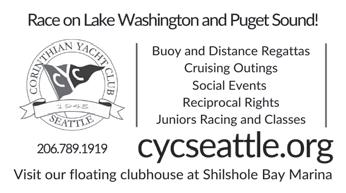
360-299-0777
Basic through Advanced Sailing Lessons Week-long Cruise & Learn lessons Spinnaker, Intro and Advance Racing Classes

Gill foulweather gear & Dubarry footwear 206-782-5100
www.seattlesailing.com info@seattlesailing.com
7001 Seaview Ave NW Suite 130 (Shilshole Bay Marina in Port of Seattle Building)
For even more photos and listings check out 48north.com/classifieds
Basic through Advanced Sailing Lessons
Week-long Cruise & Learn lessons
Spinnaker, Intro and Advance Racing Classes
Gill foulweather gear & Dubarry footwear 206-782-5100
www.seattlesailing.com info@seattlesailing.com



7001 Seaview Ave NW Suite 130
(Shilshole Bay Marina in Port of Seattle Building)
BellevueSail&PowerSquadron,weare America’sBoatingClubofBellevue THEPOWEROFEDUCATION


Website:
American Sailing Association courses Basic Keelboat 101 through Advanced Coastal 206 Based in Beautiful Anacortes, WA sailtime.com/location/anacortes/sailing-school info@seattleyachts.com
360-299-0777
Offshore Sailing for Women
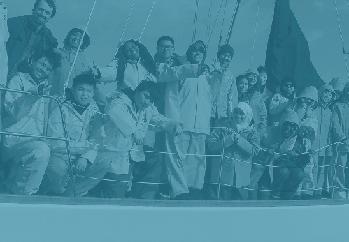
Nancy Erley, Instructor 206.789.5118 nancy@tethysoffshore.com www.tethysoffshore.com

(619) 224-2349 • Fax (619) 224-4692 • 2330 Shelter Island Dr. #207 San Diego, CA 92106 www.yachtfinders.biz • info@yachtfinders.biz

70’ SANTA

.................... $395,000

“WESTERLY” Completely updated. No expense spared. An excellent opportunity to obtain an up-to-date SC 70 and get sailing now. Sidney, BC.

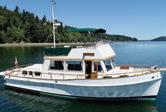
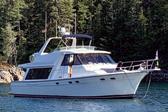
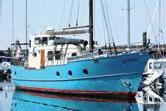
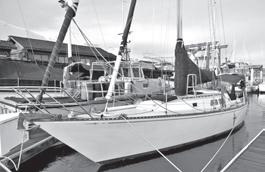



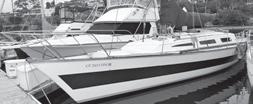
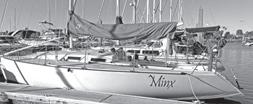
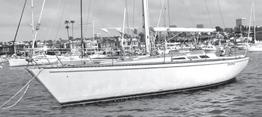
“ANTARES” Open transom walk through boarding platform. Cold-molded, three skins with epoxy sheathing the entire hull

44’
PETERSON KP44 ’79 ..................... $74,500
“KAREN B” A clean, wellmaintained example of this cruising classic with handsome lines from renowned naval architect Doug Peterson.
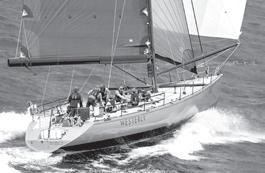
41’ NEWPORT 41

..................... $49,500
“PETREL” For an adventurer thinking of sailing to distant horizons and exploring the world PETREL could easily fulfill your dreams.
X-Yachts, a renowned brand from Denmark, unveils their latest cruising gem, the Xc47. This high-performance yacht is designed for secure extended voyages, adeptly handling open ocean challenges with a small crew. Its robust hull, sheltered cockpit, and smart rigging empower the helmsman. Crafted with advanced techniques and premium materials, the Xc47 excels in both durability and performance. Inside, a semi deck saloon offers panoramic views, abundant light, and comfort during extended journeys. The layout includes 3 cabins, a convertible dining area, and a spacious galley. Efficient storage is seamlessly integrated, showcasing X-Yachts’ dedication to innovation and craftsmanship.






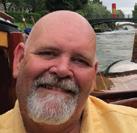
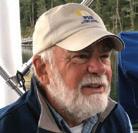





Graceful under sail, comfortable, safe and easy to handle, the McCurdy and Rhodes designed Sou’wester 59 is another in a long line of fine yachts built by the Hinckley Company of Southwest Harbor Maine. From her gleaming Awlgripped topsides with signature gold leaf cove stripe to her masterfully constructed cherry interior with solid teak and holly sole, Sula is a showpiece of high-quality construction. But she’s not just a beautiful yacht, having proven herself as a capable offshore cruiser with a passage to New Zealand in her wake. Sula’s protected center cockpit, well-conceived three stateroom interior, systems access, and ample storage space above and below decks add to her allure as a long-distance cruiser. Push button mainsail and genoa furling and powered winches allow easy shorthanded sailing. A powerful bow thruster aids in maneuvering in small spaces, truly making her a vessel that may be handled by a cruising couple without extra crew.
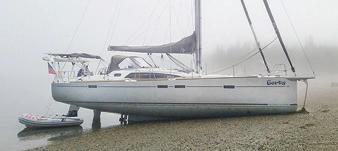
With brokers on both west and east coasts, Swiftsure Yachts is dedicated to providing premium service to sailors buying or selling quality yachts.

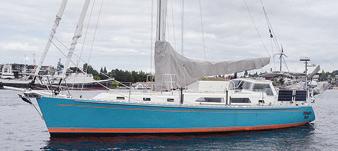
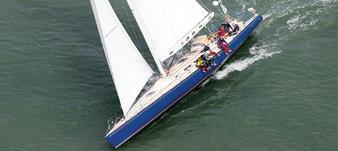
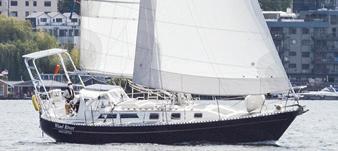

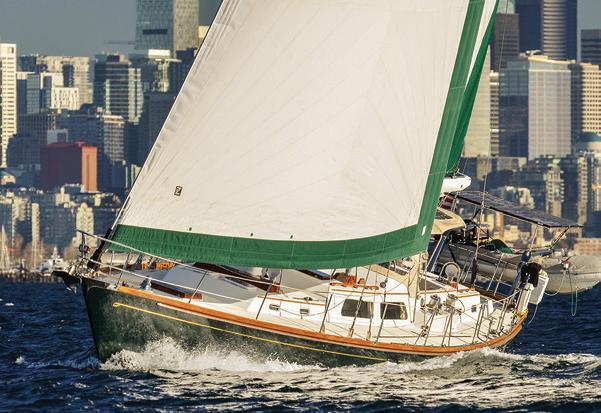
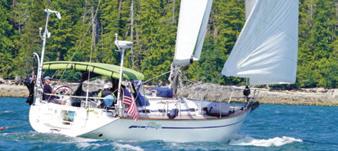





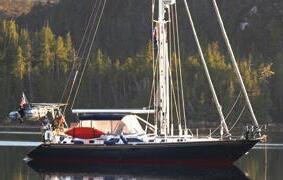


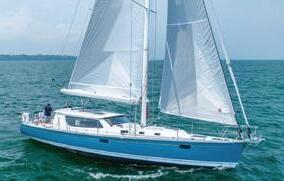
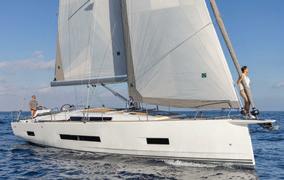
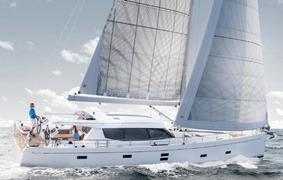










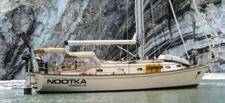

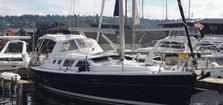



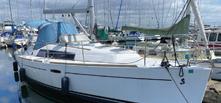


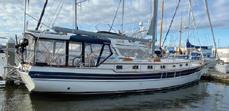
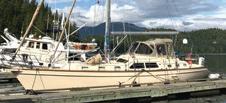








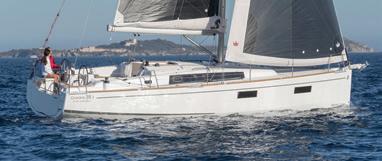

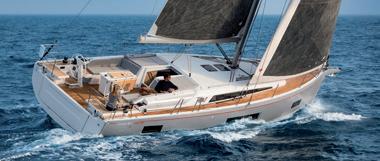
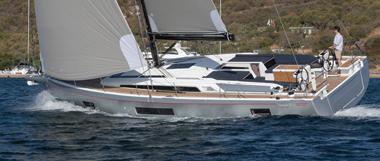
Jeanneau has led the way in modern yacht design by embracing innovative thinking and modern technology. The Sun Odyssey 490 has been completely reimagined to meet the needs of today’s cruising sailor. Life aboard has never been so comfortable.

